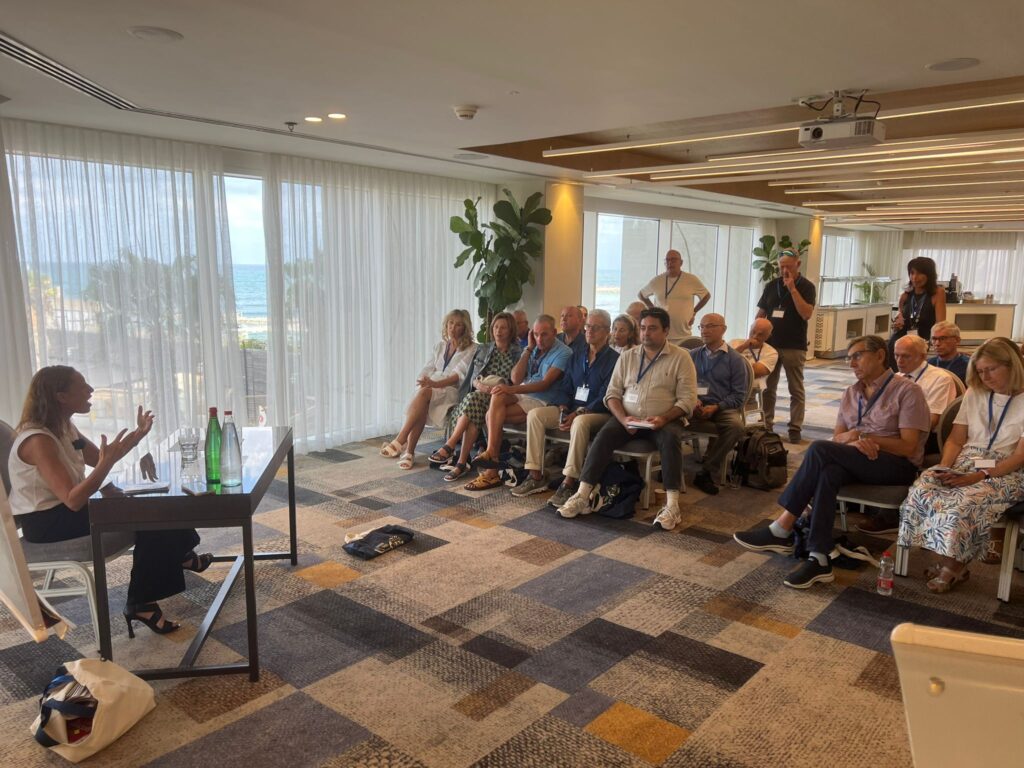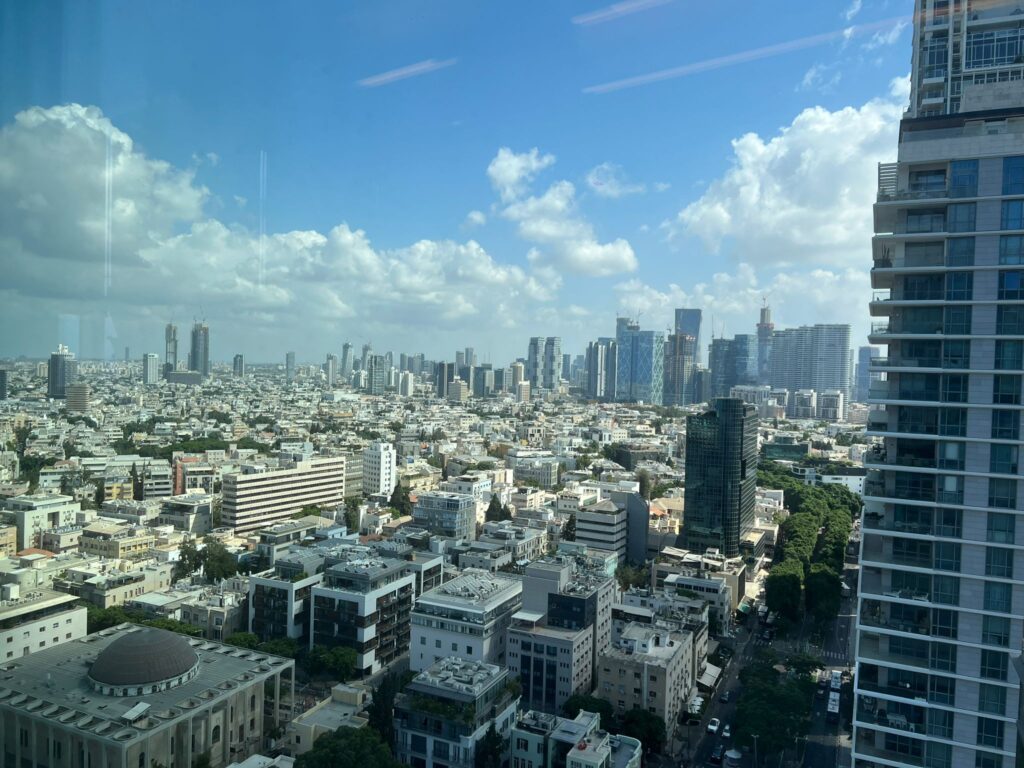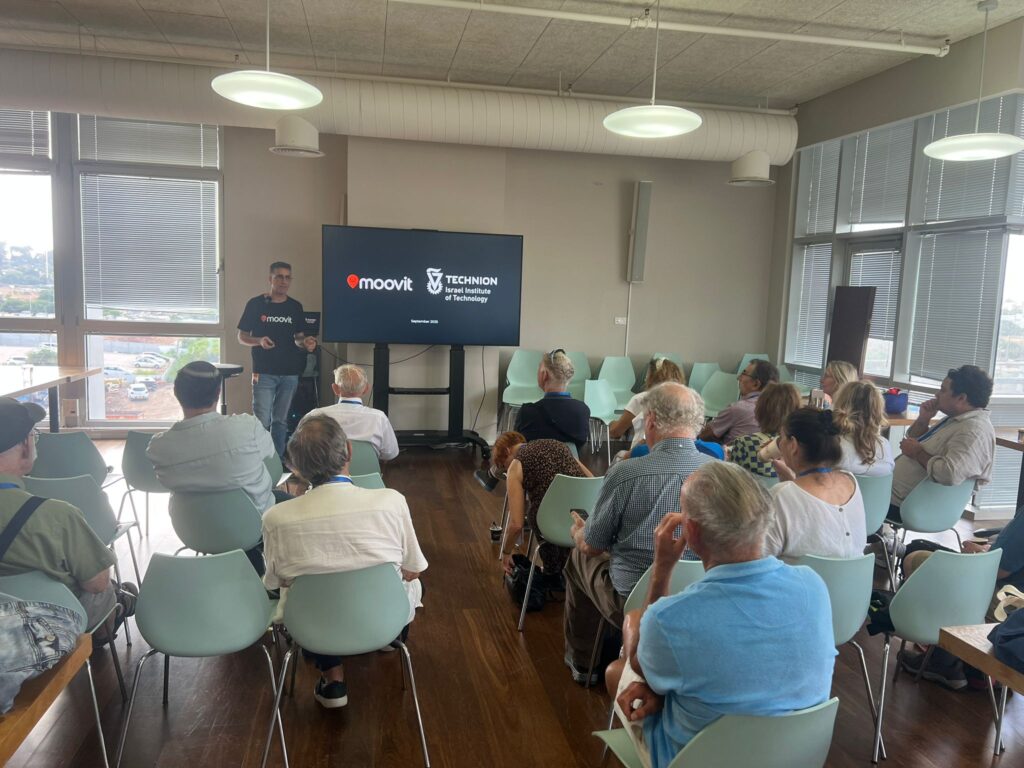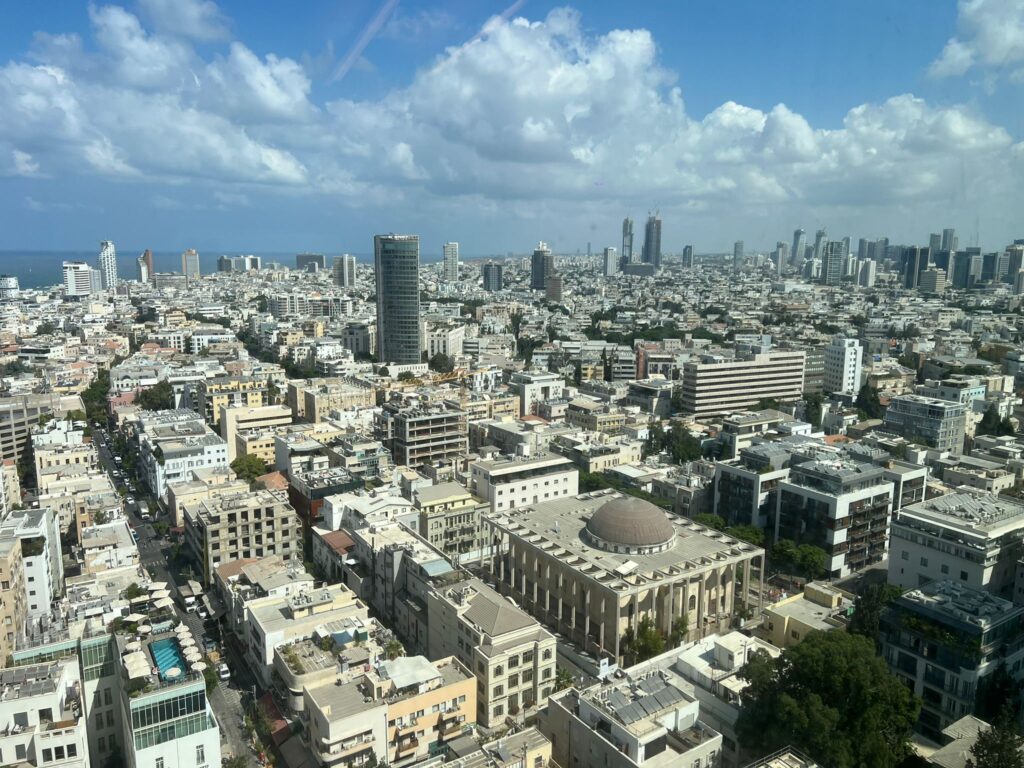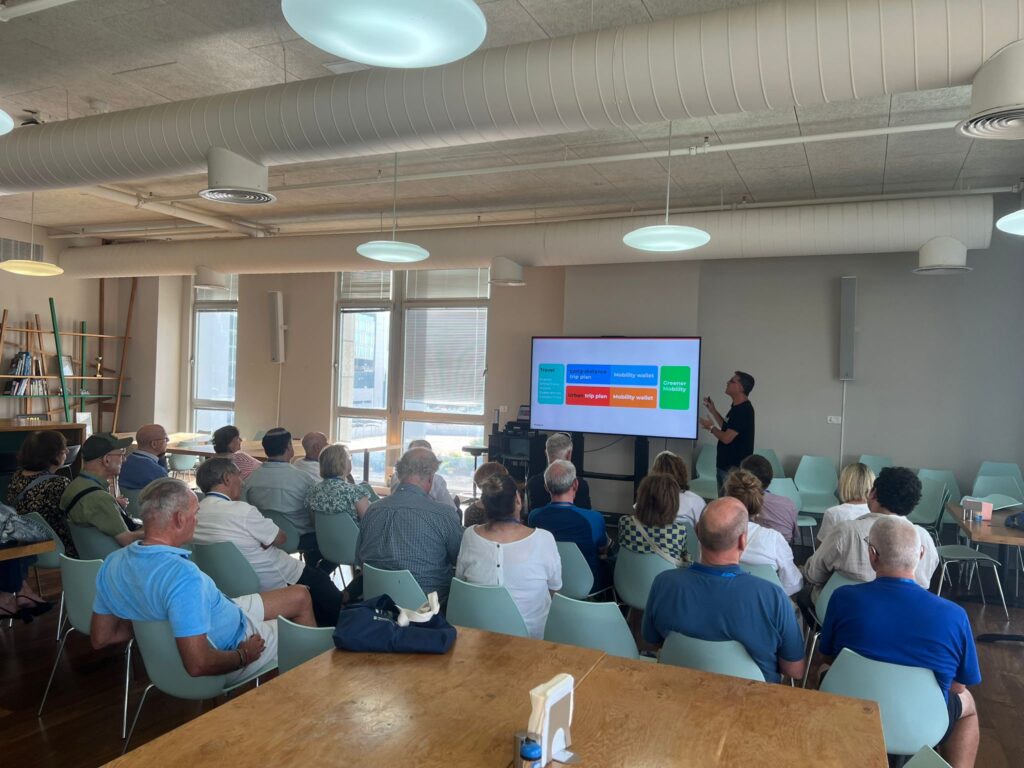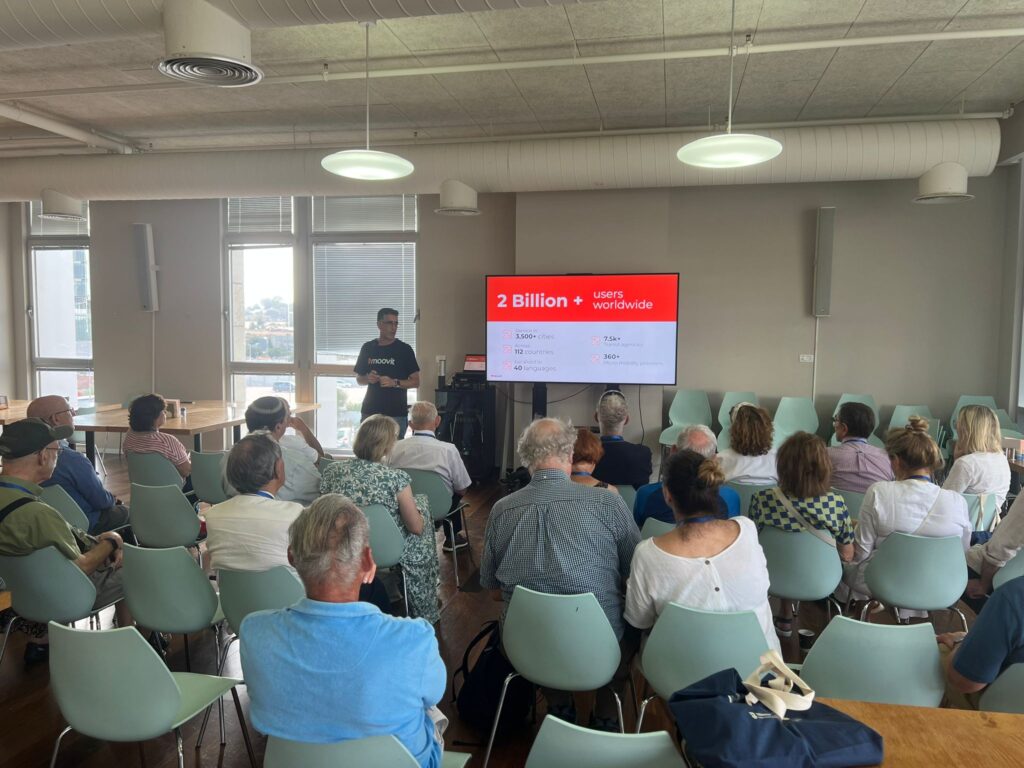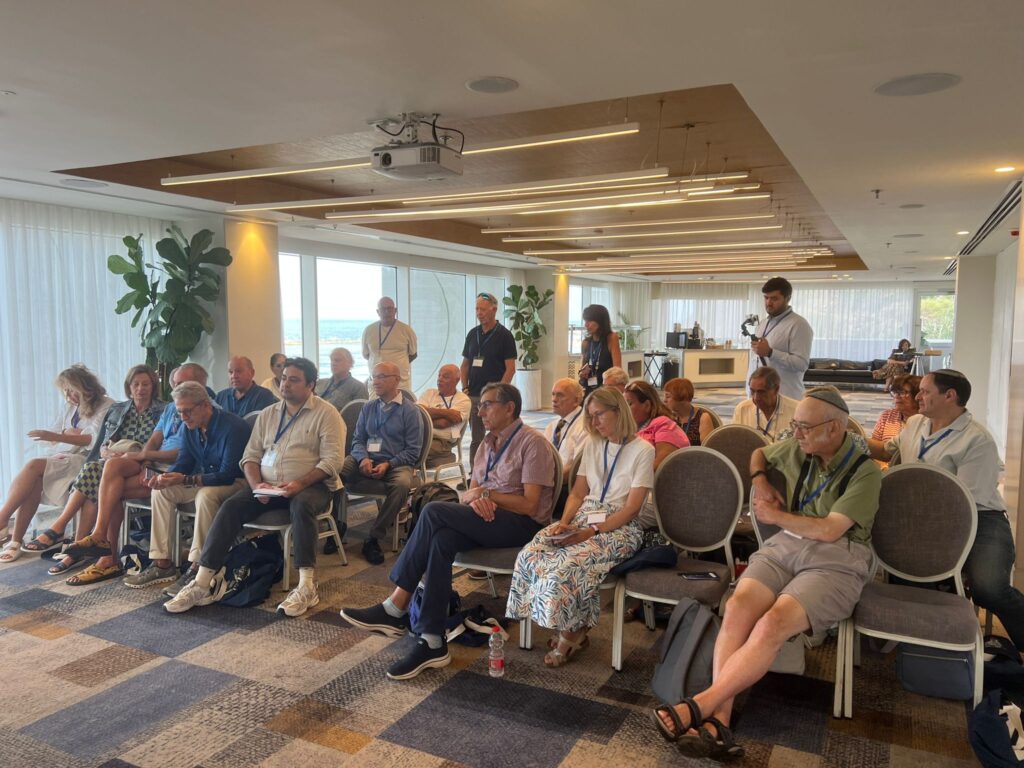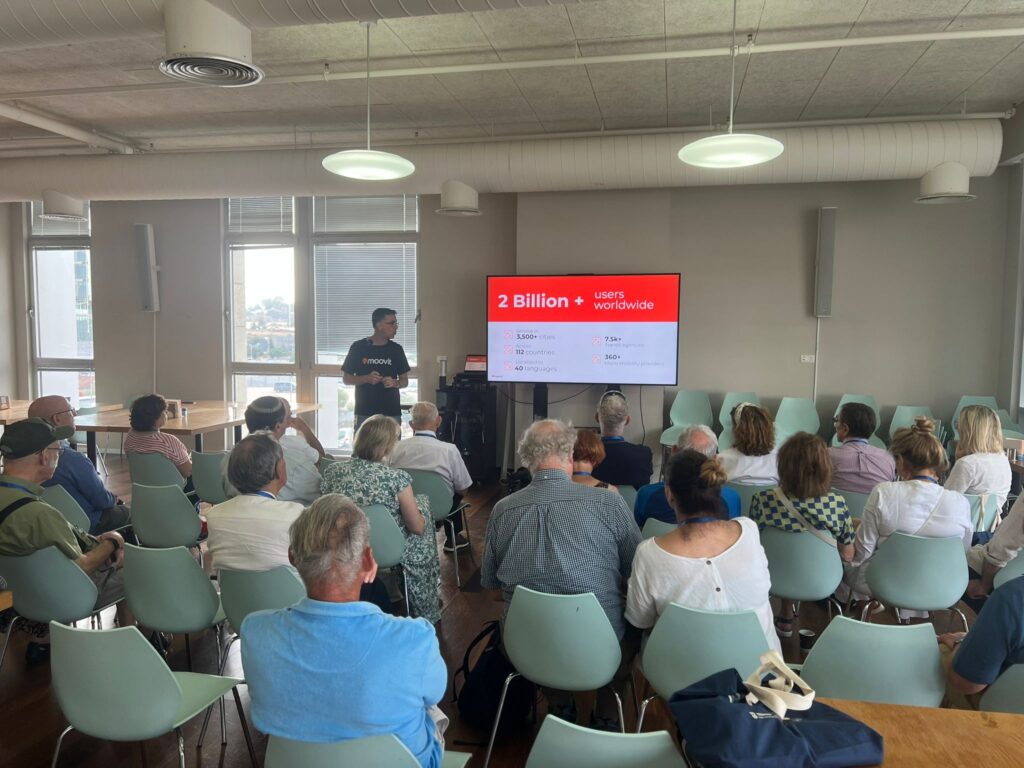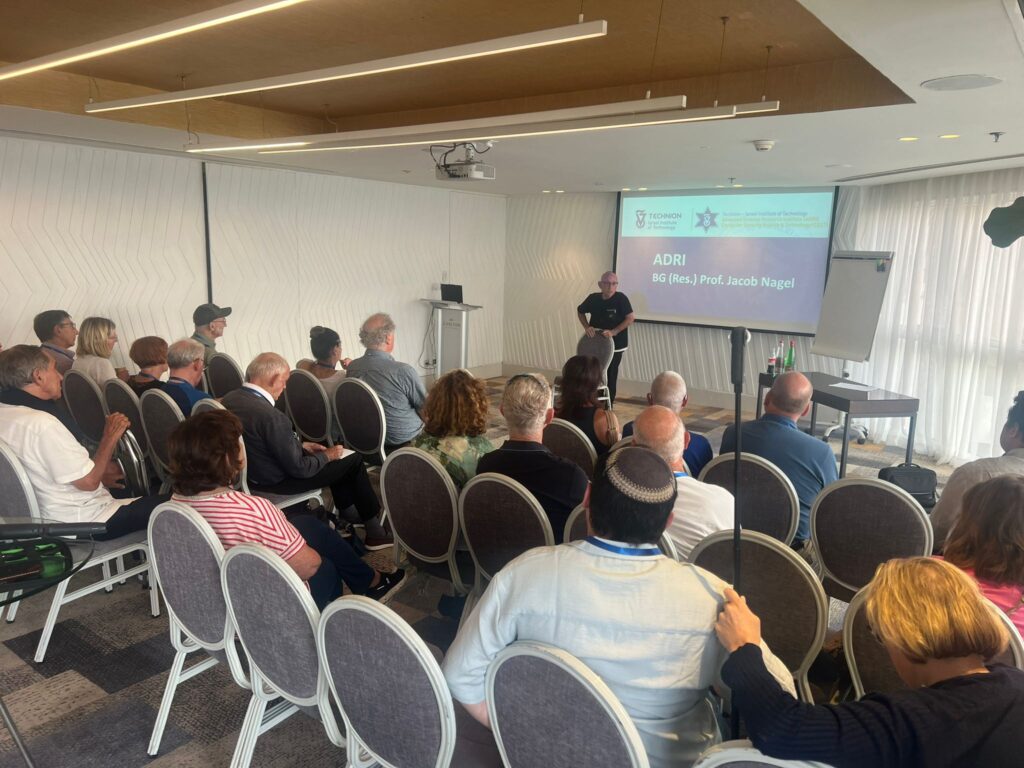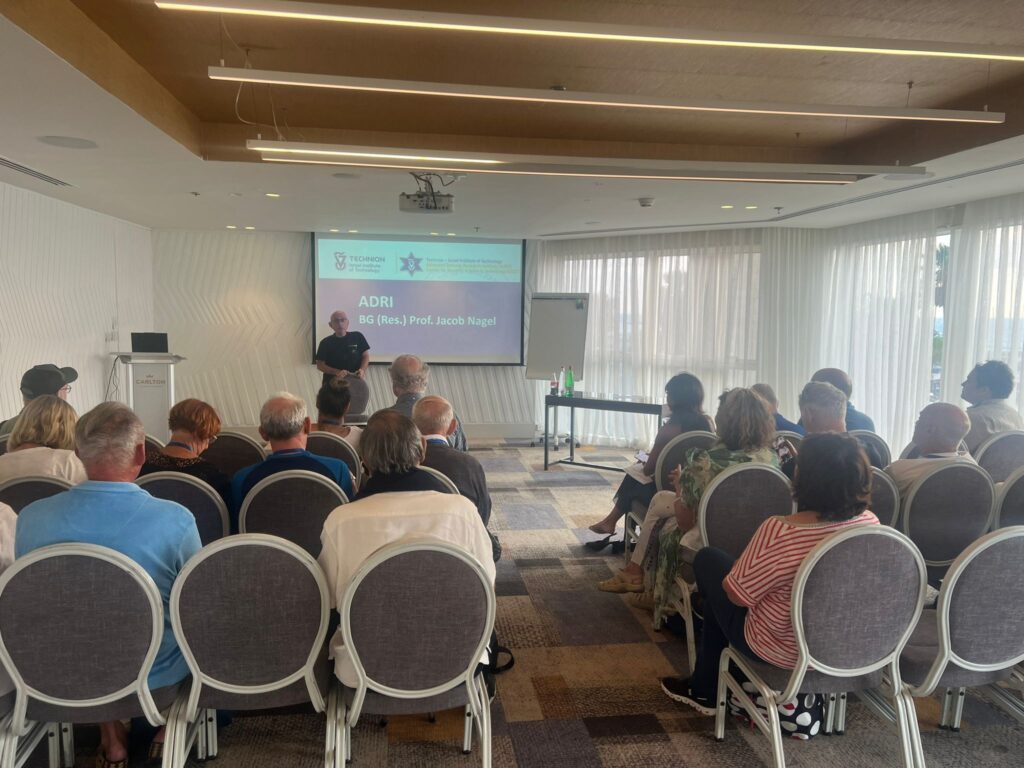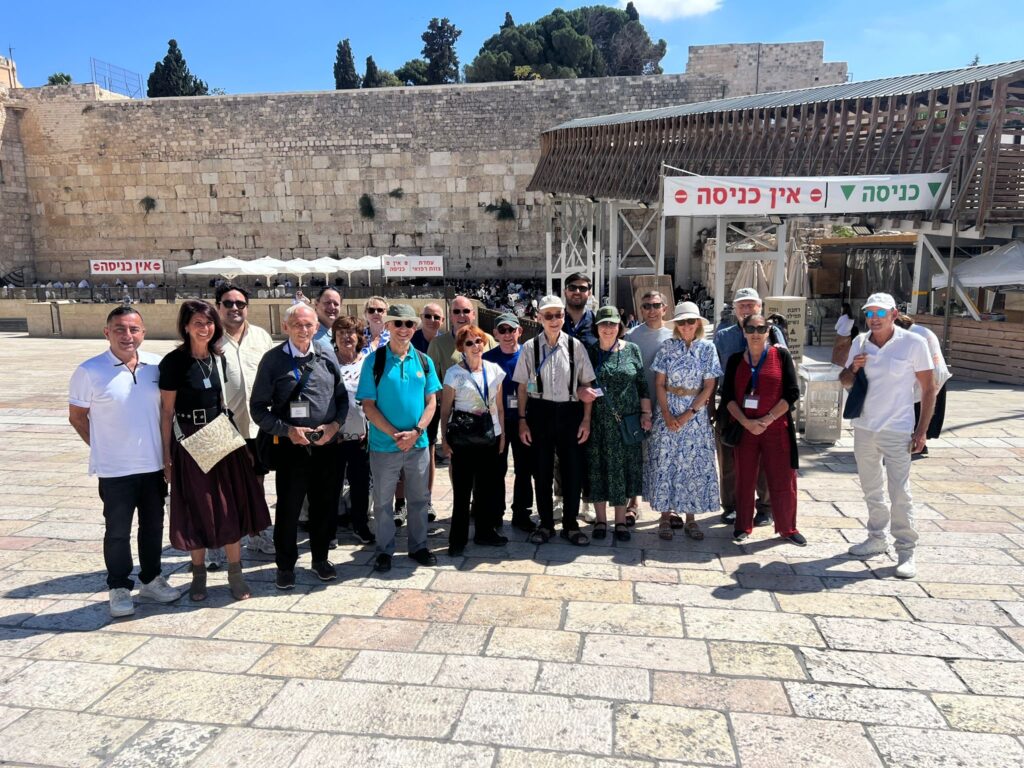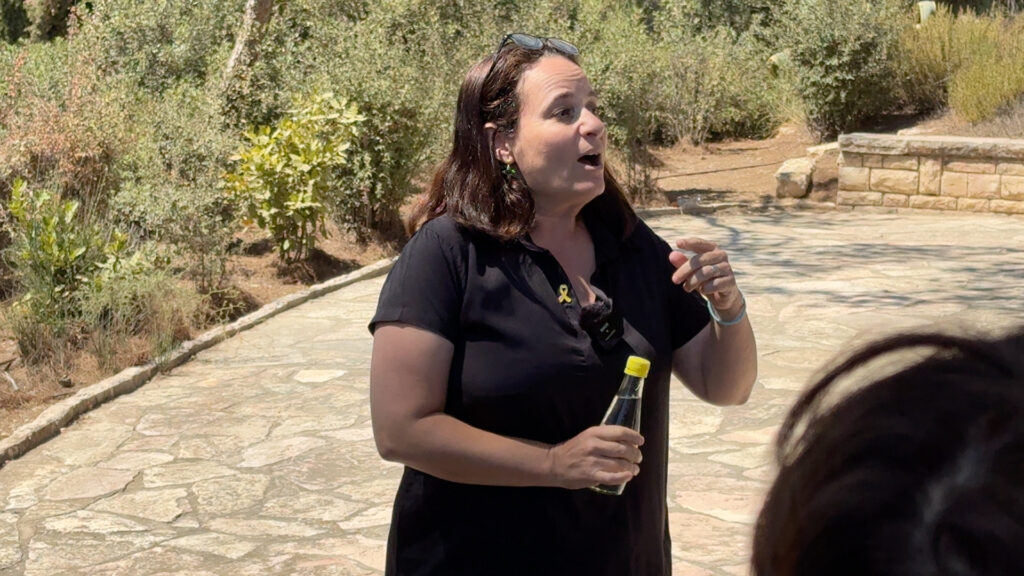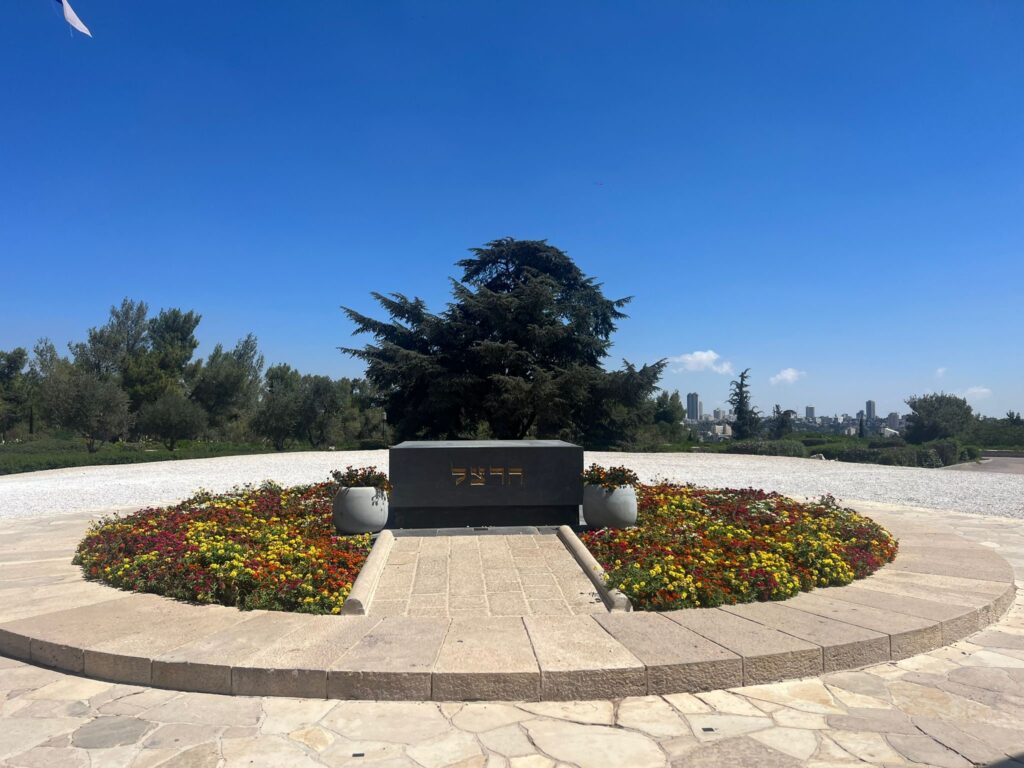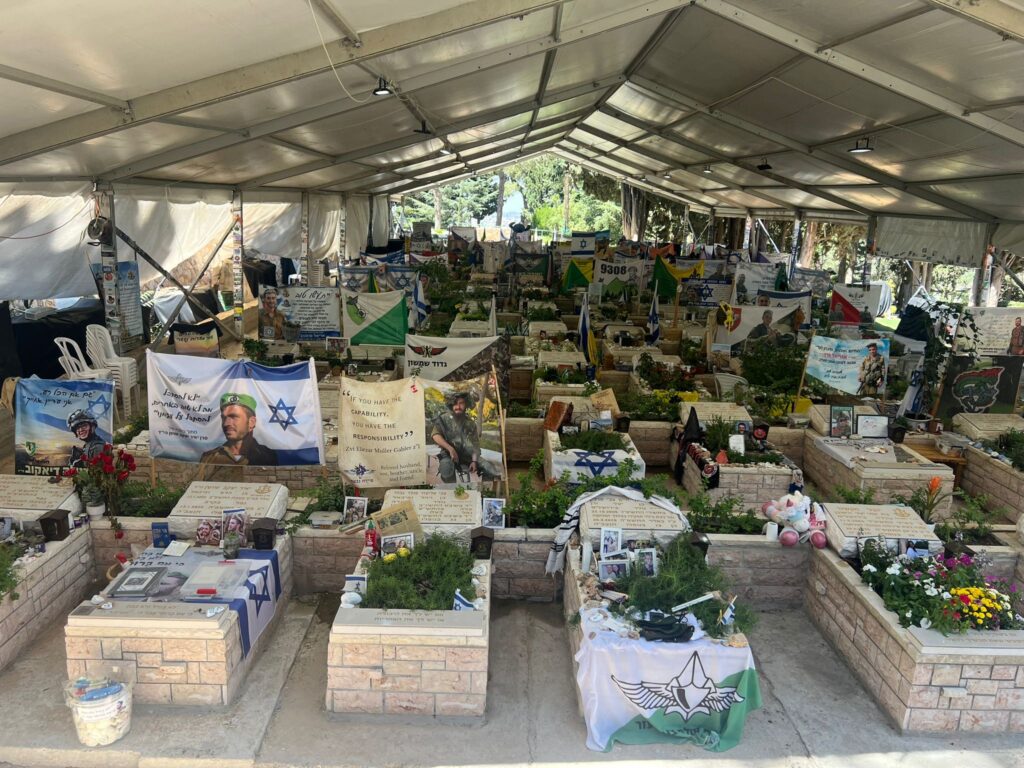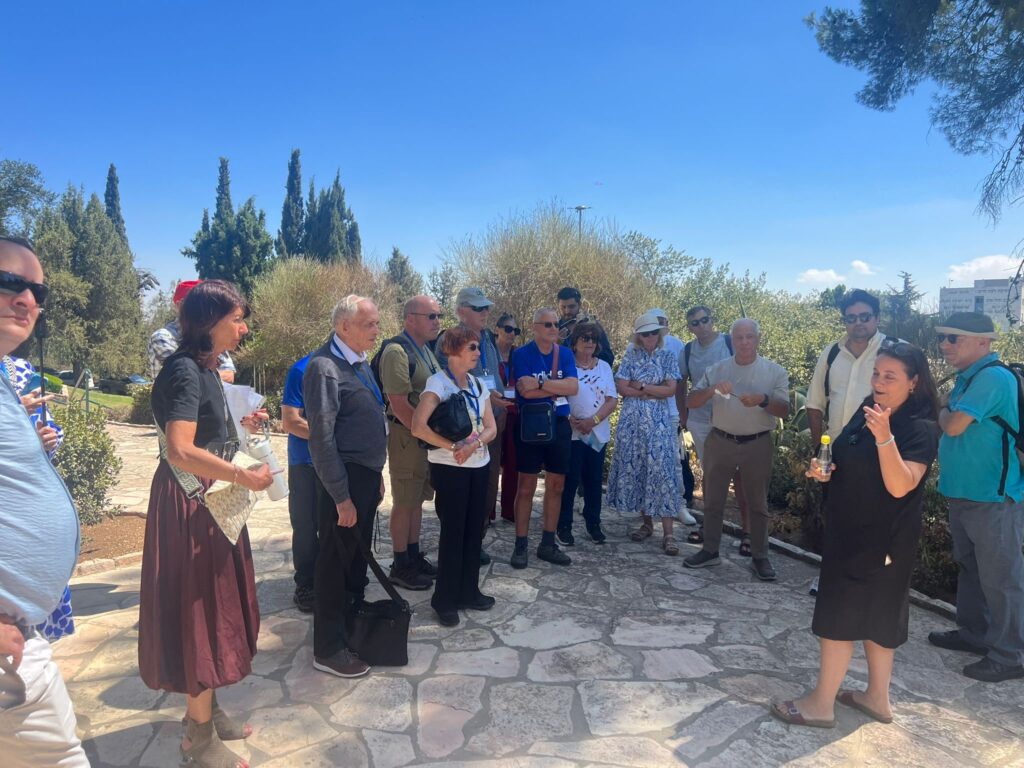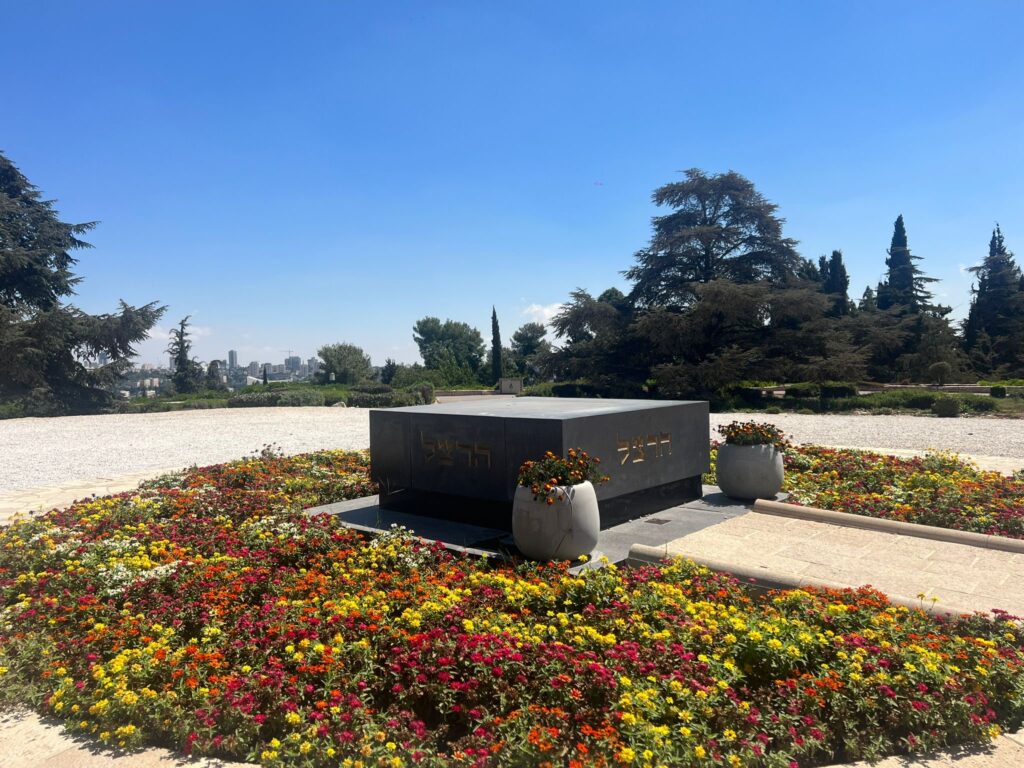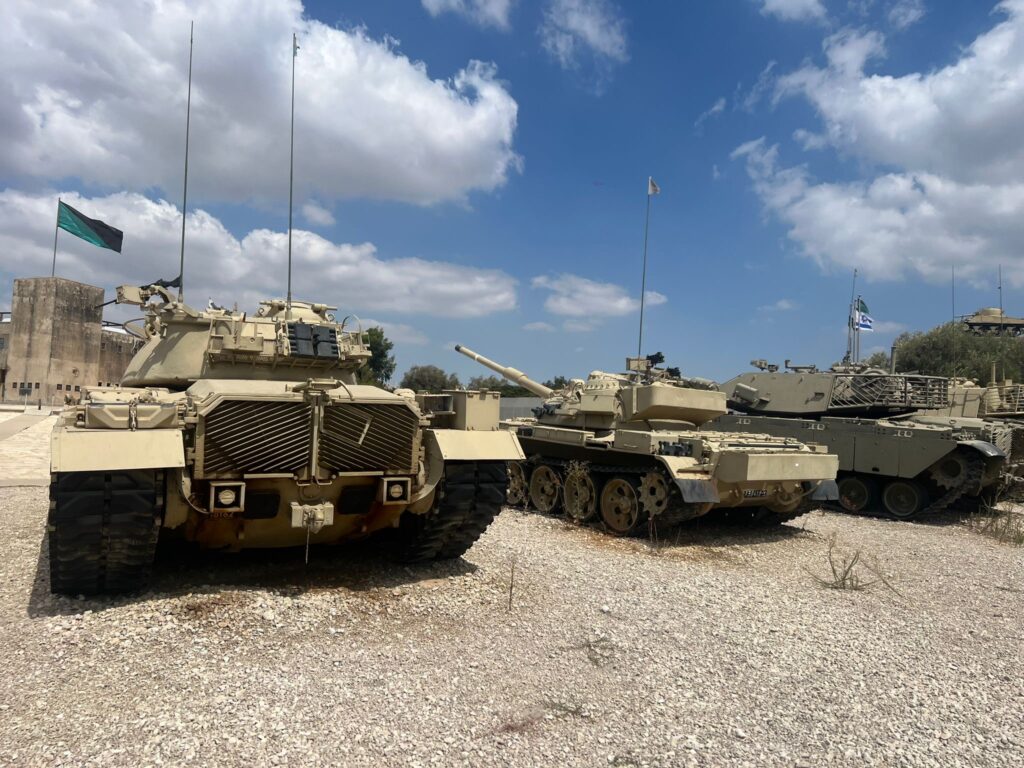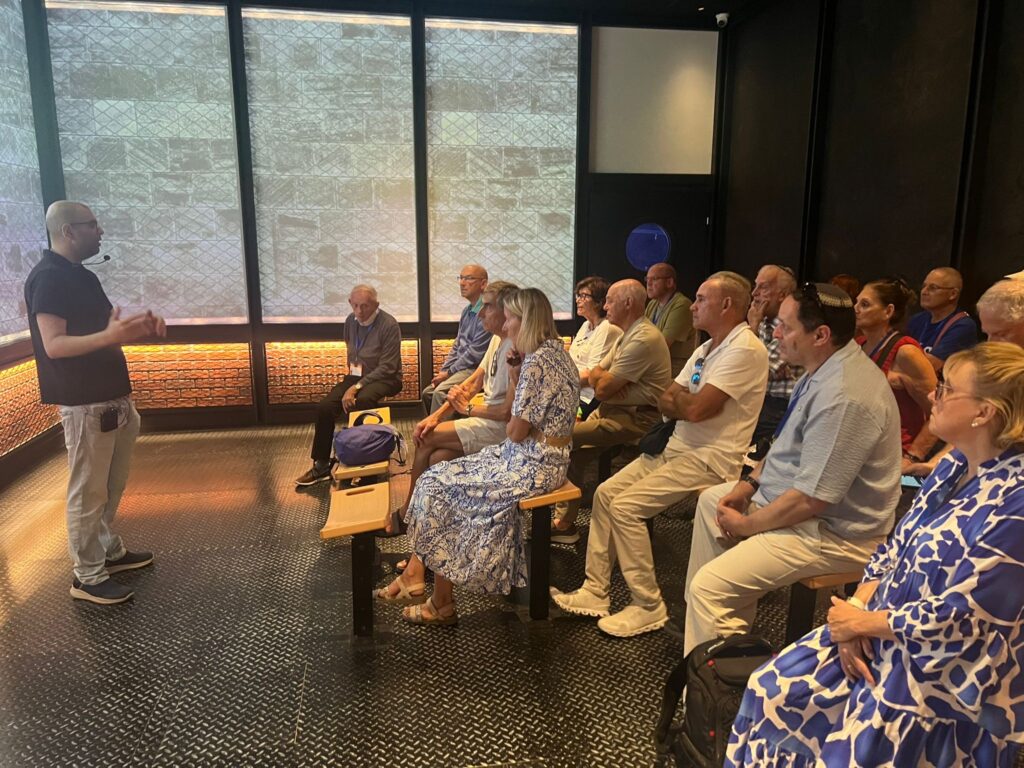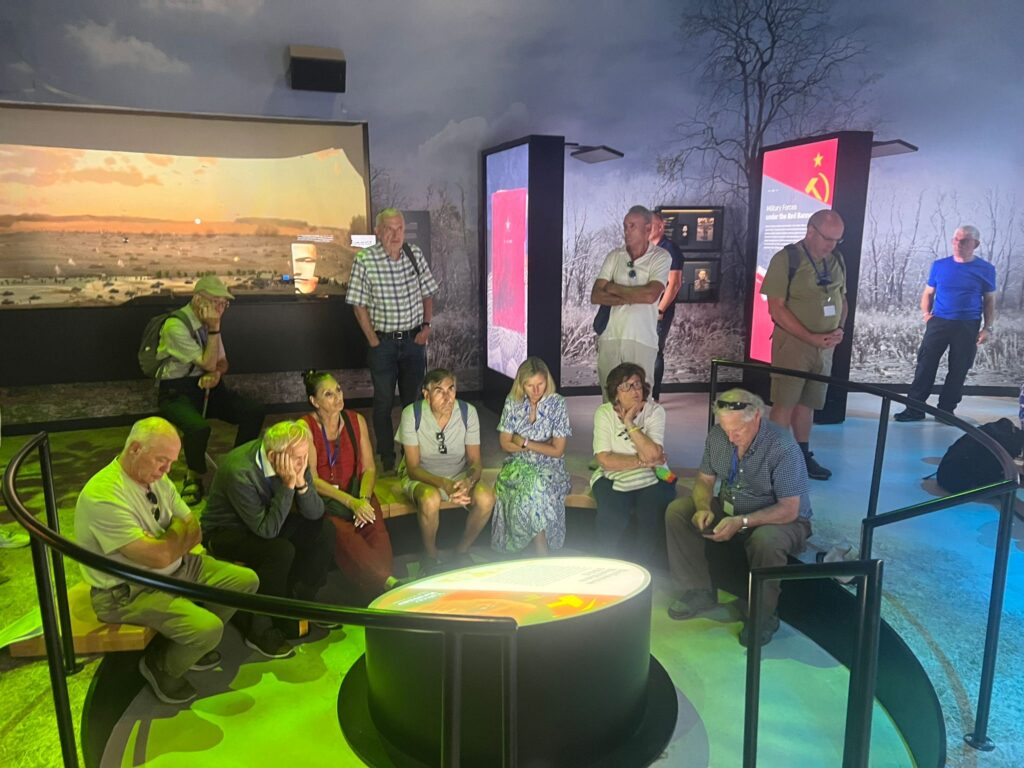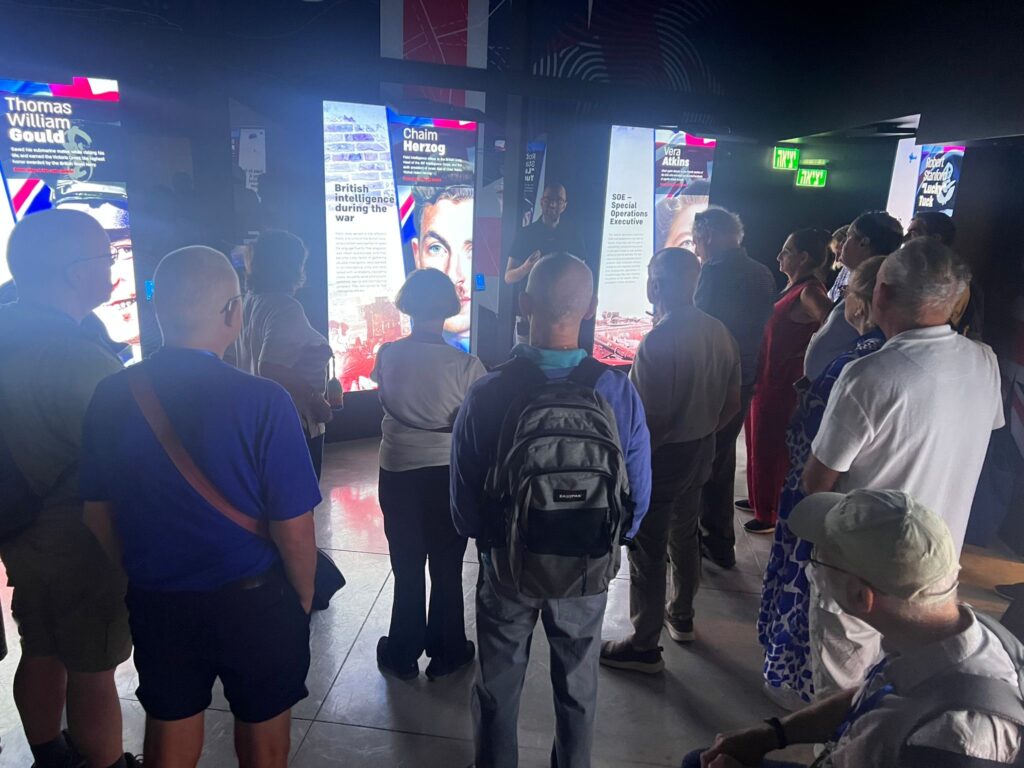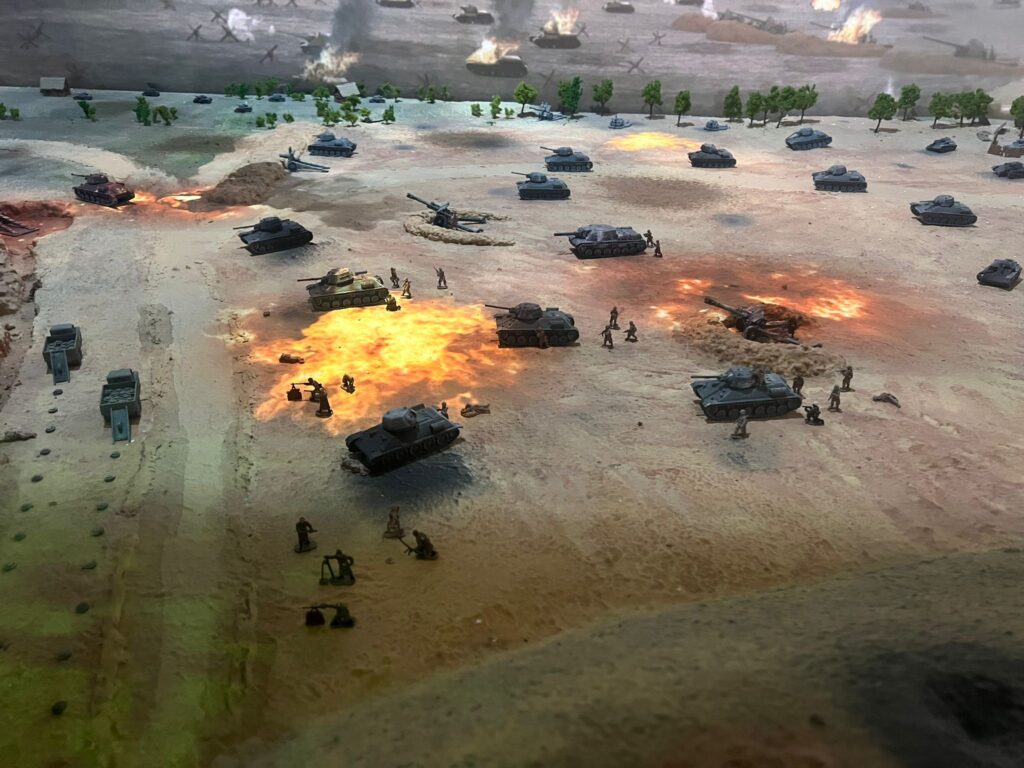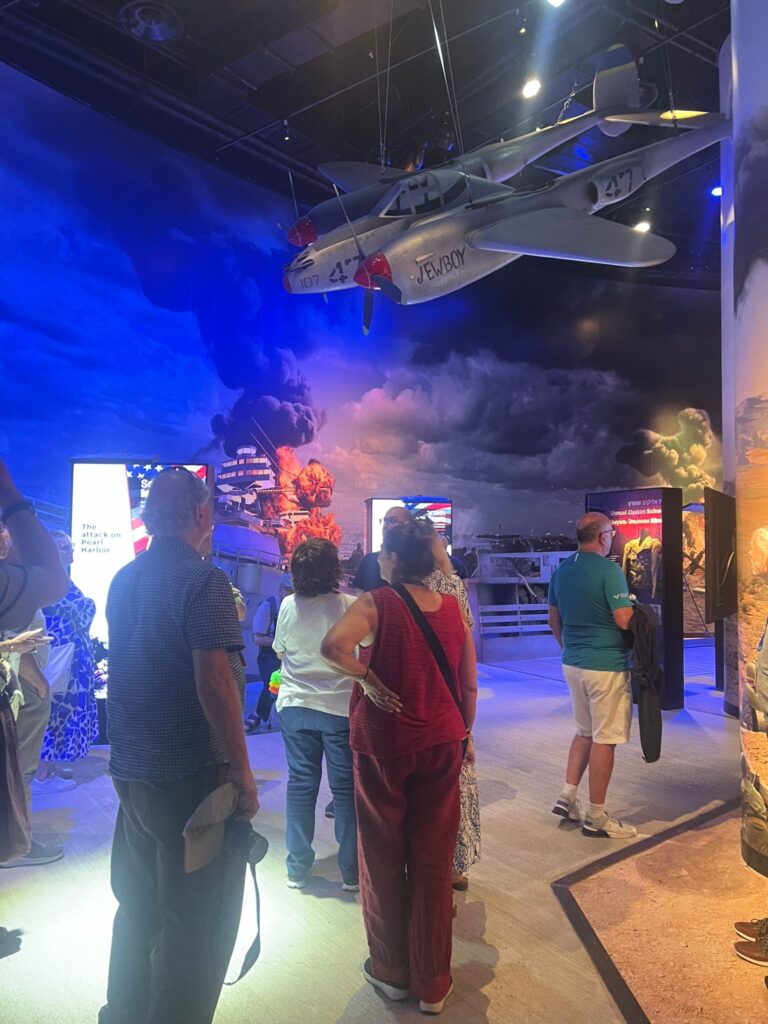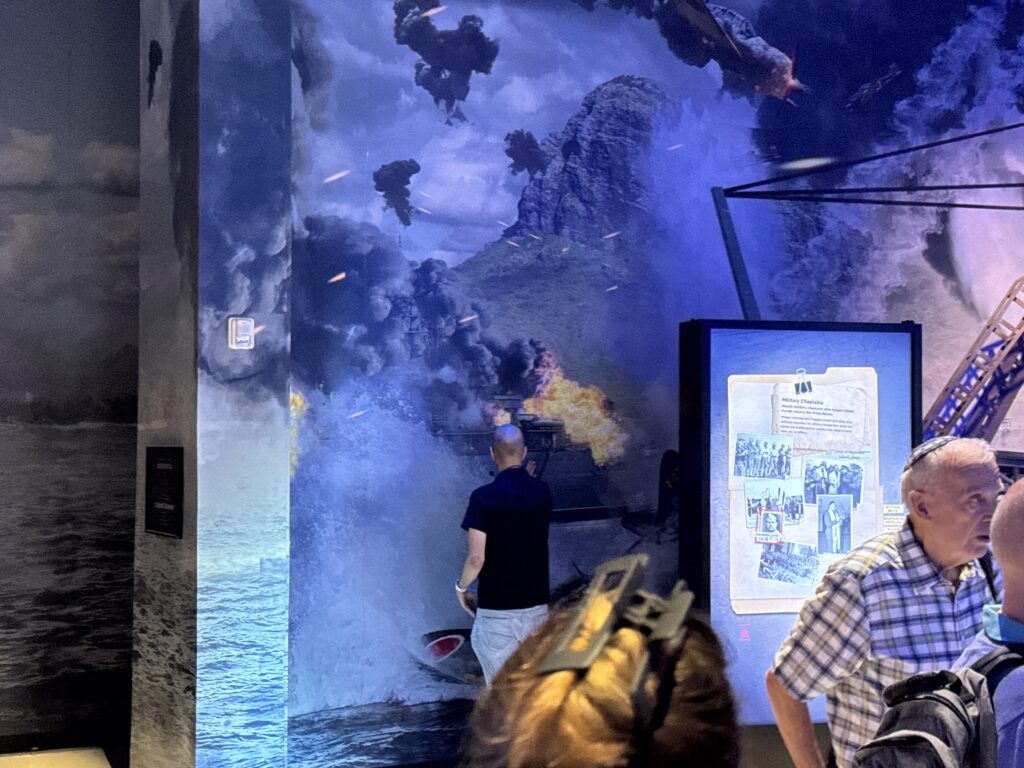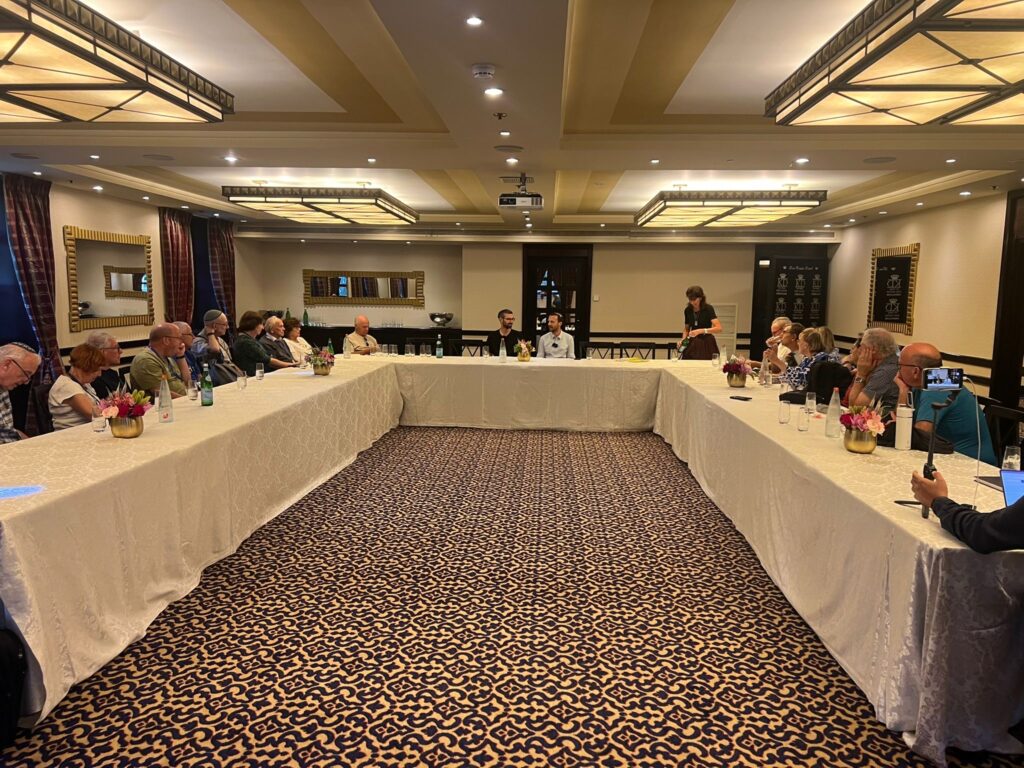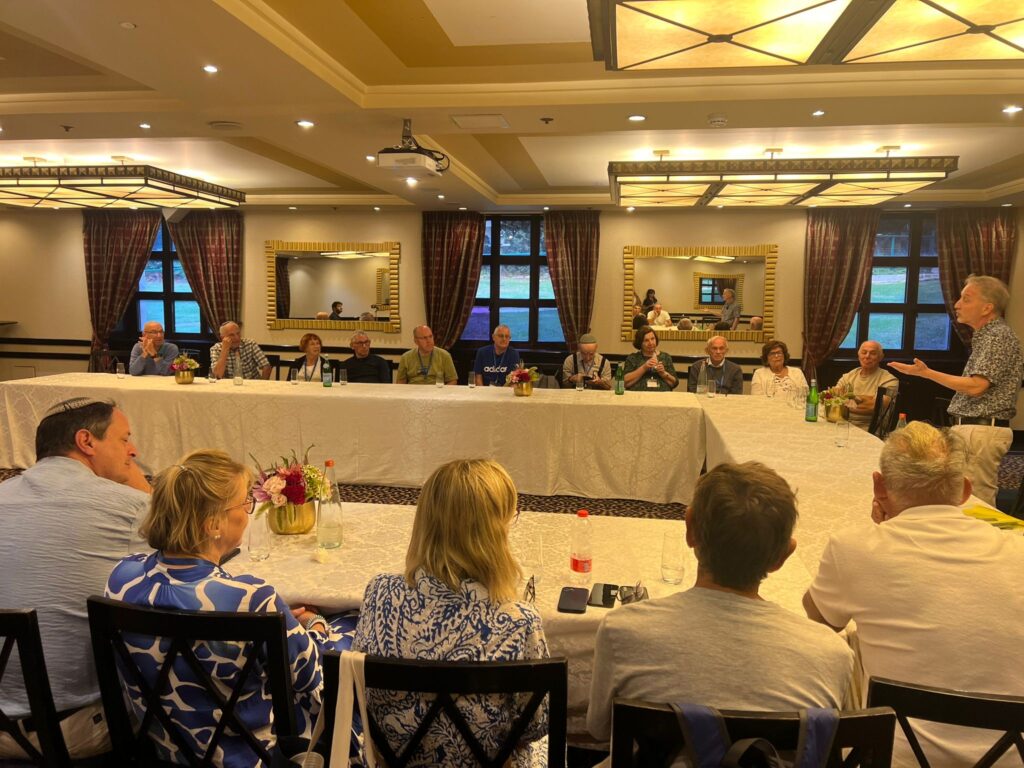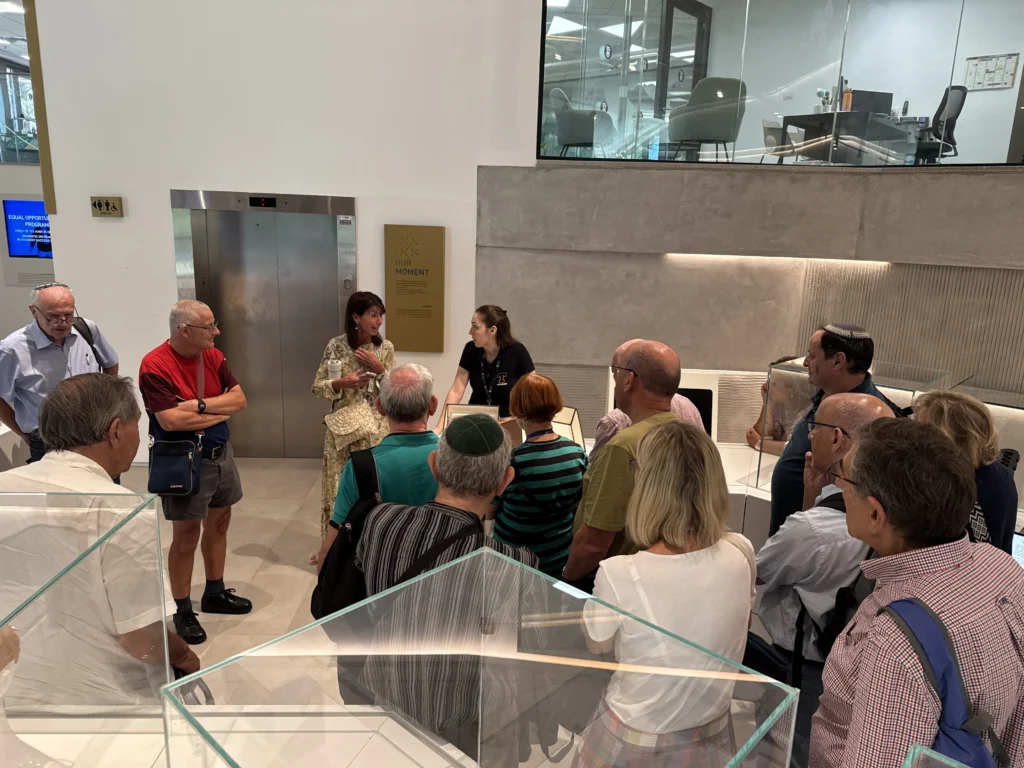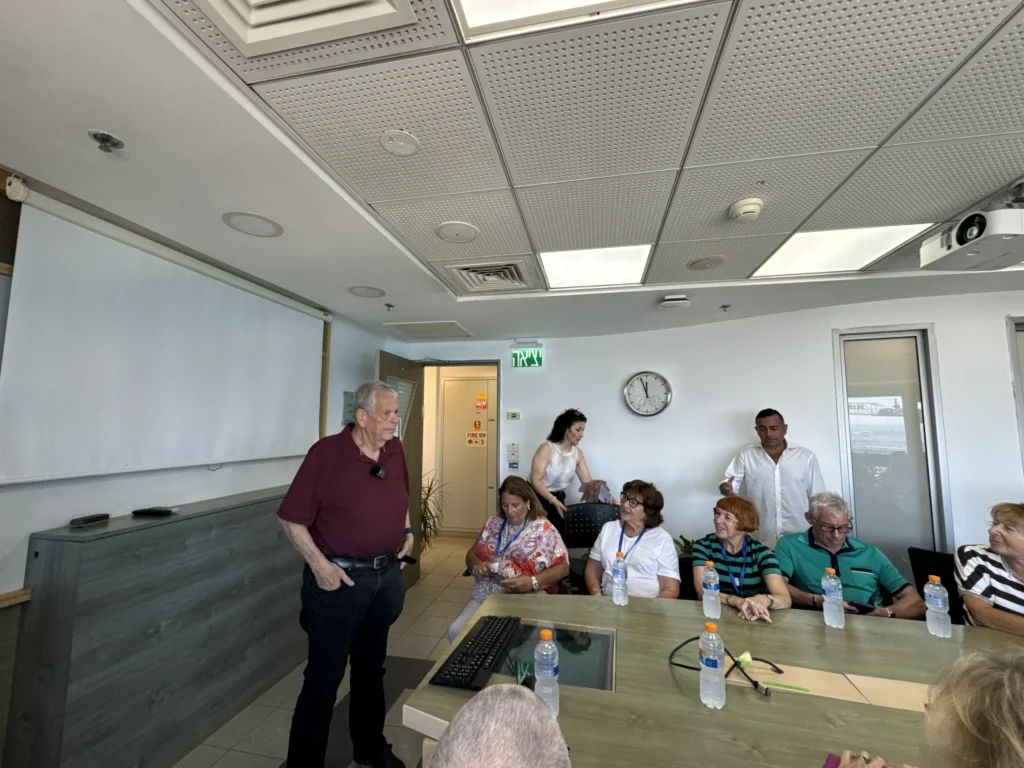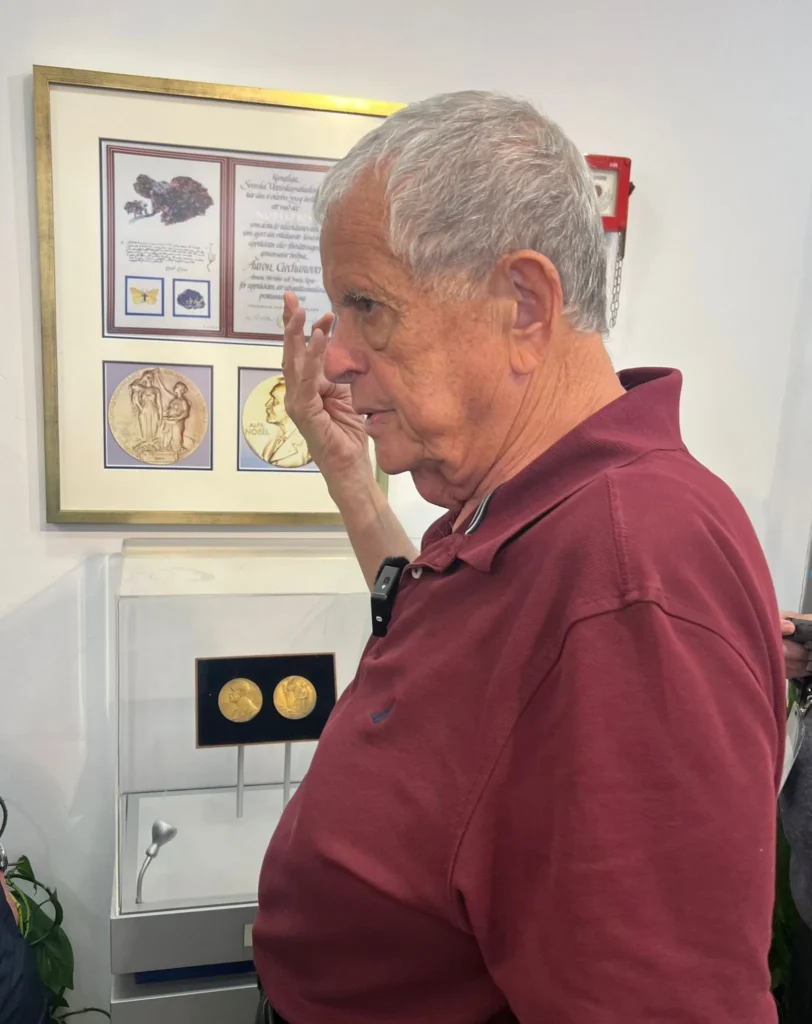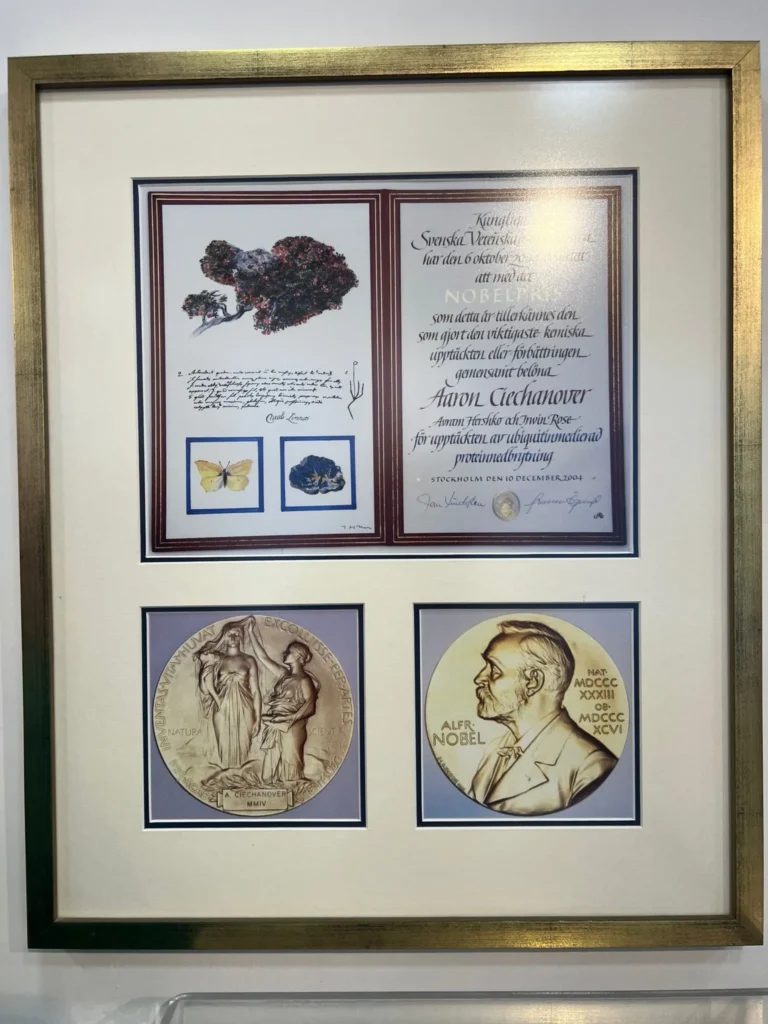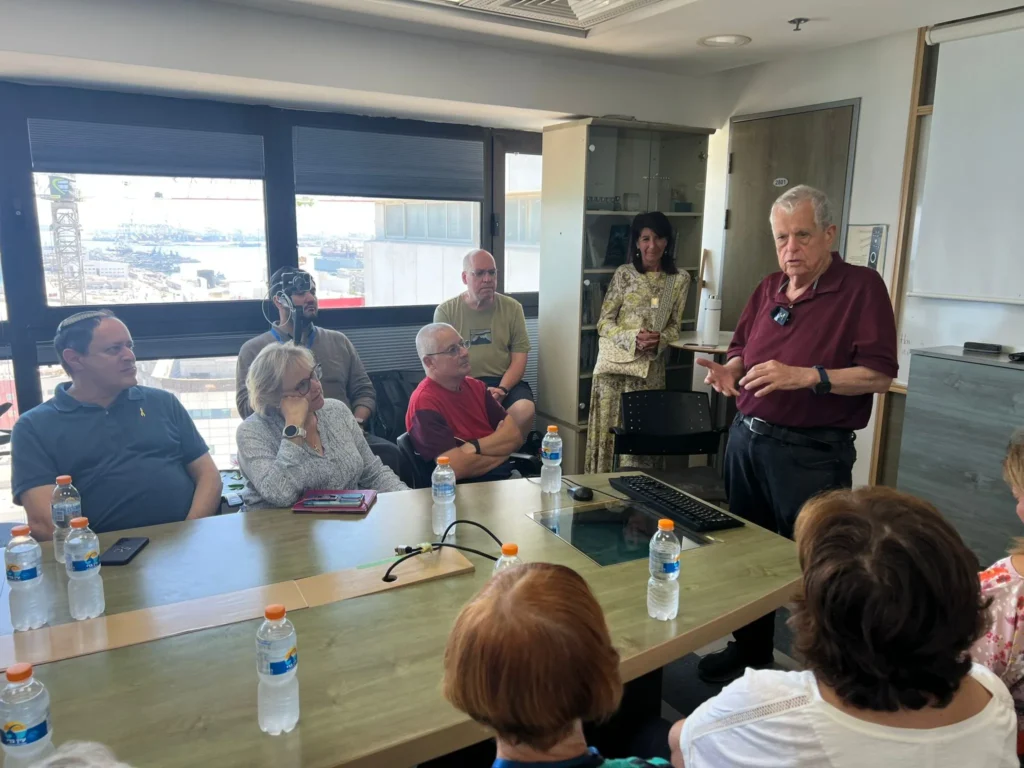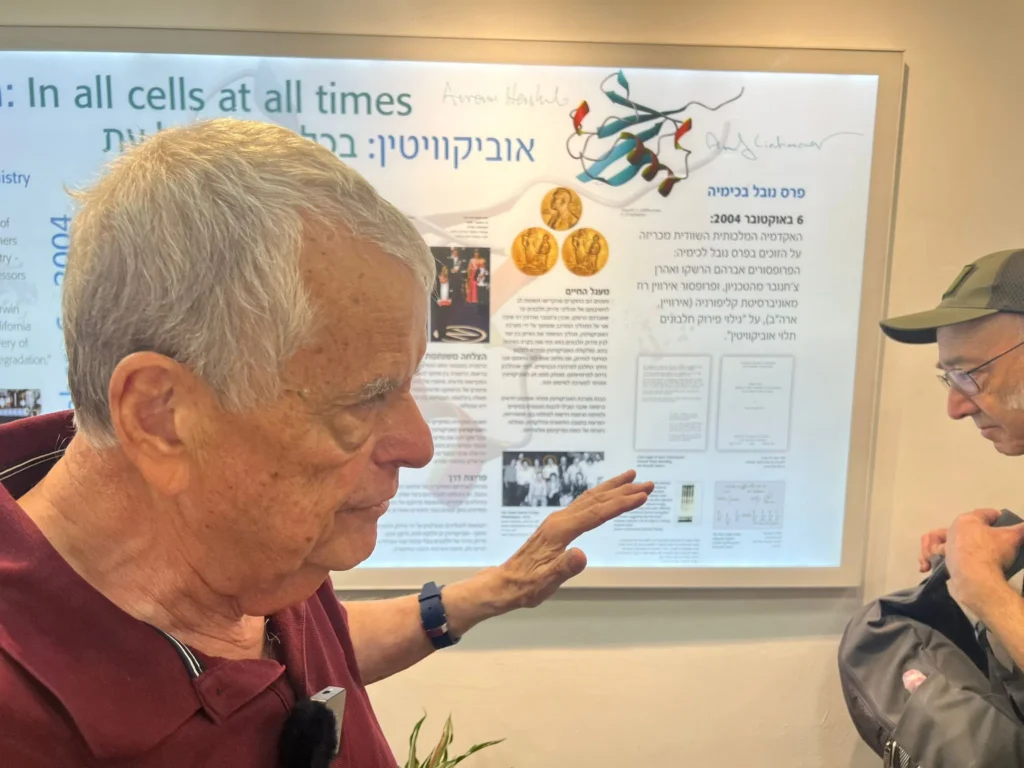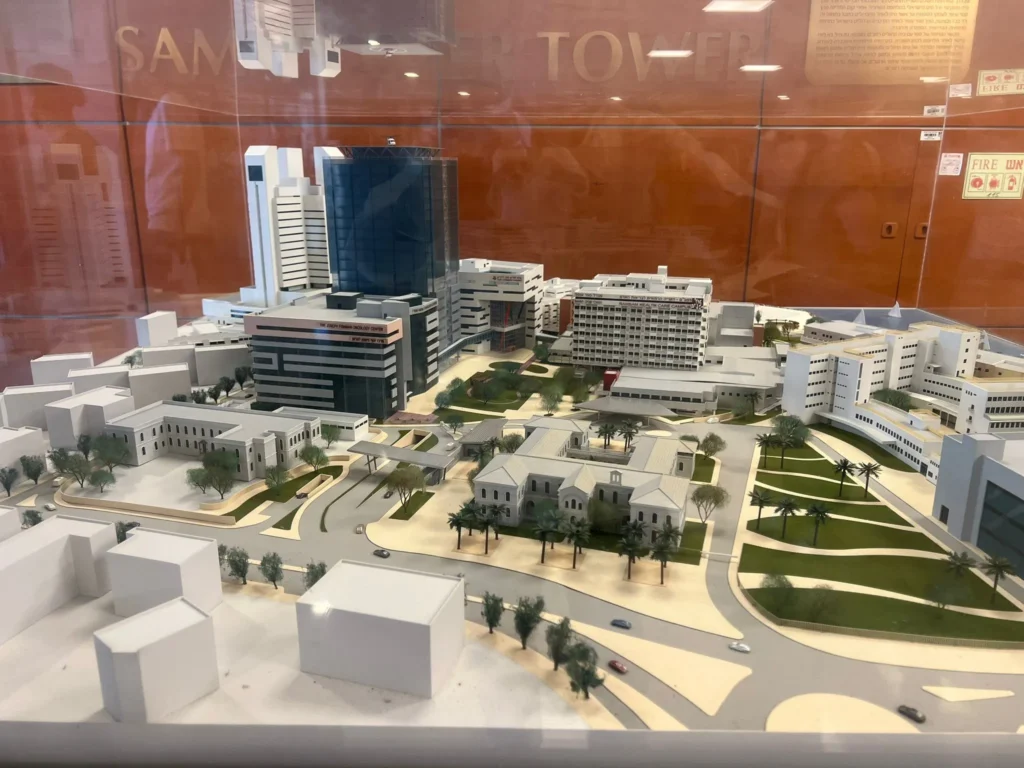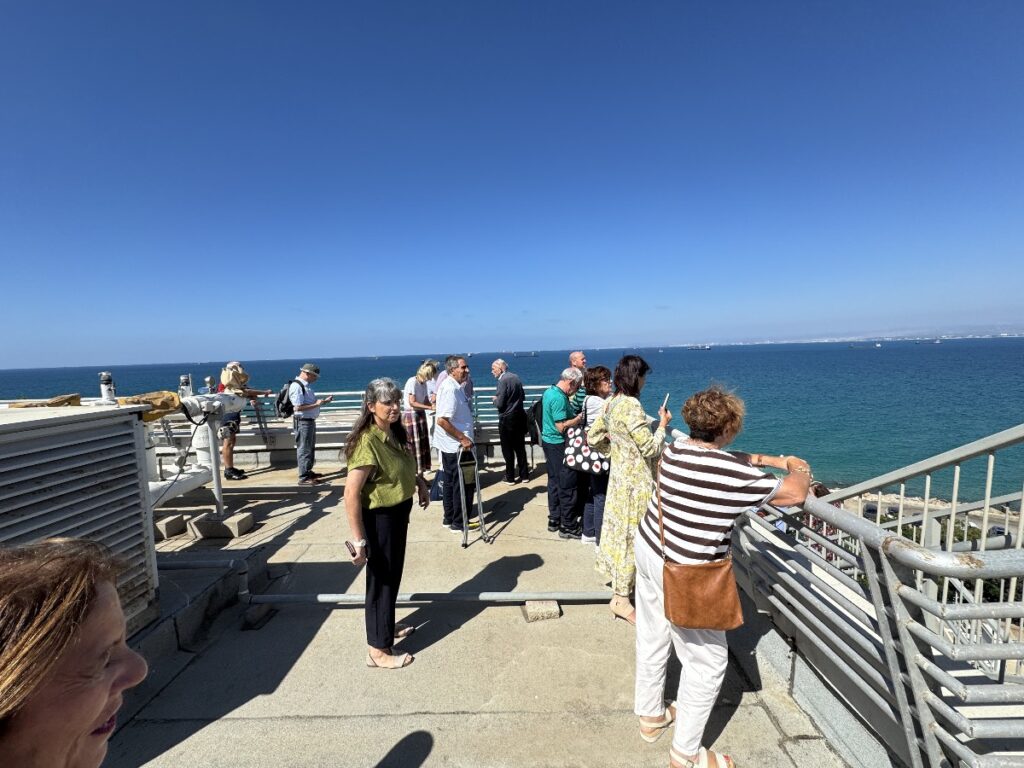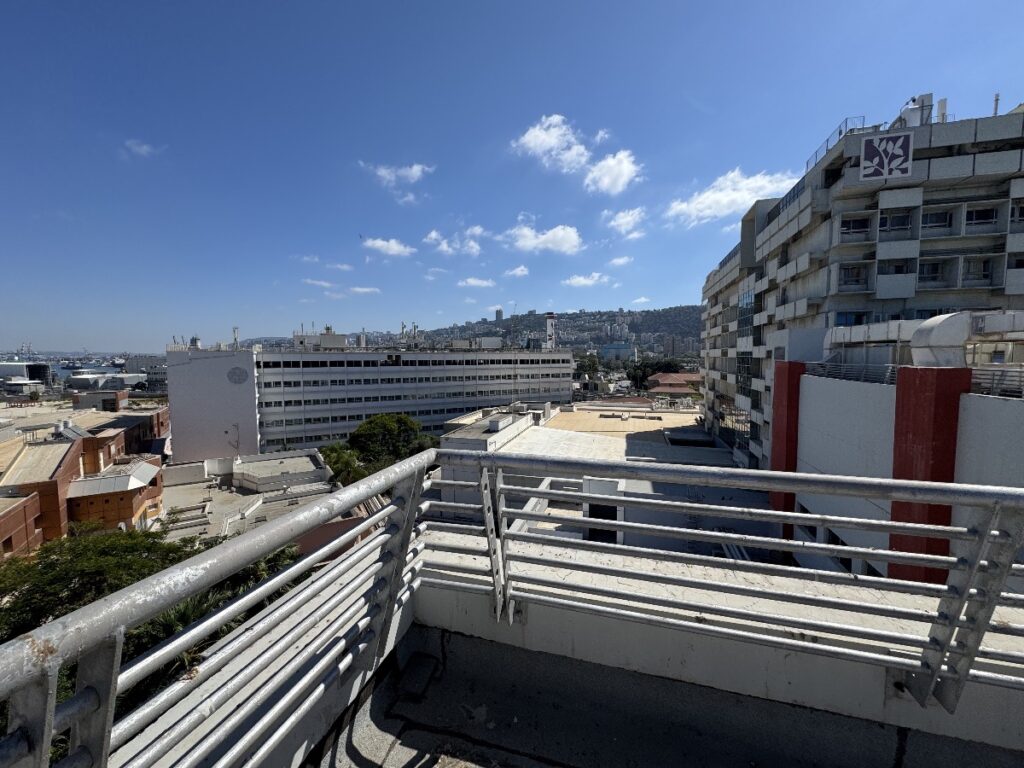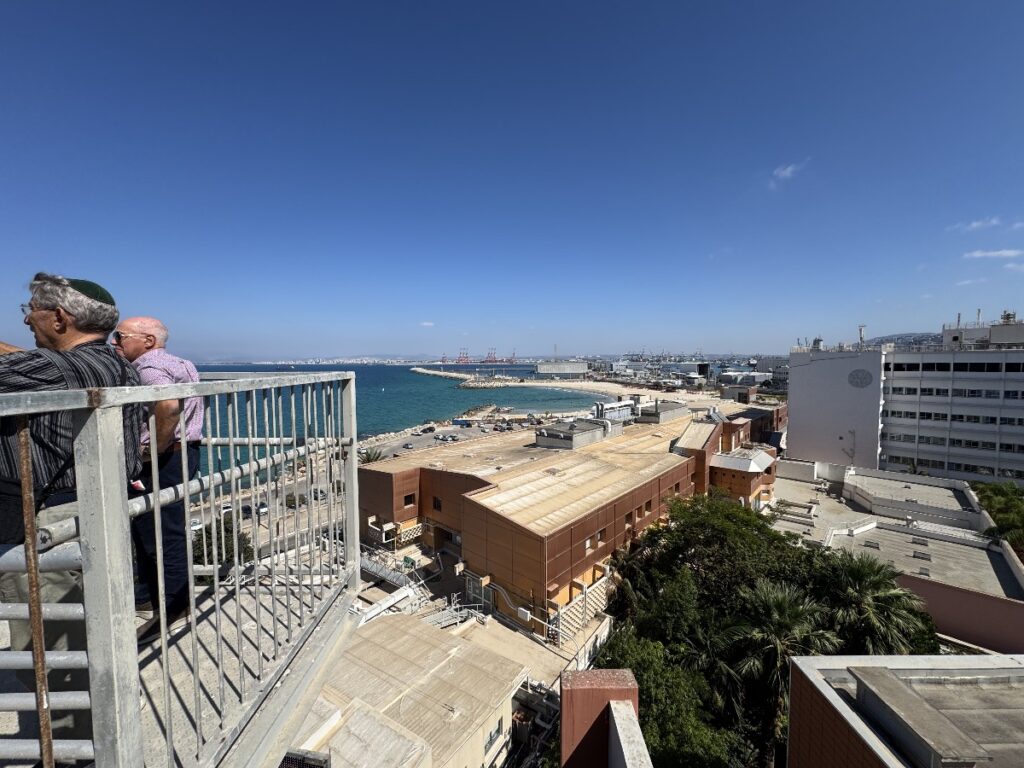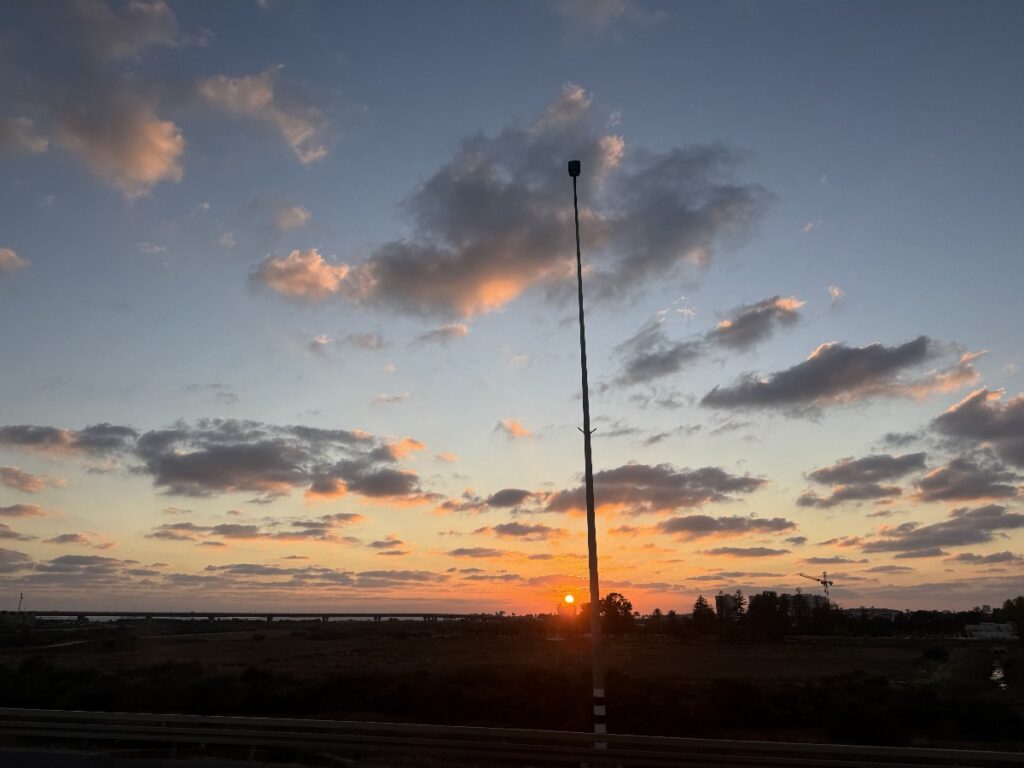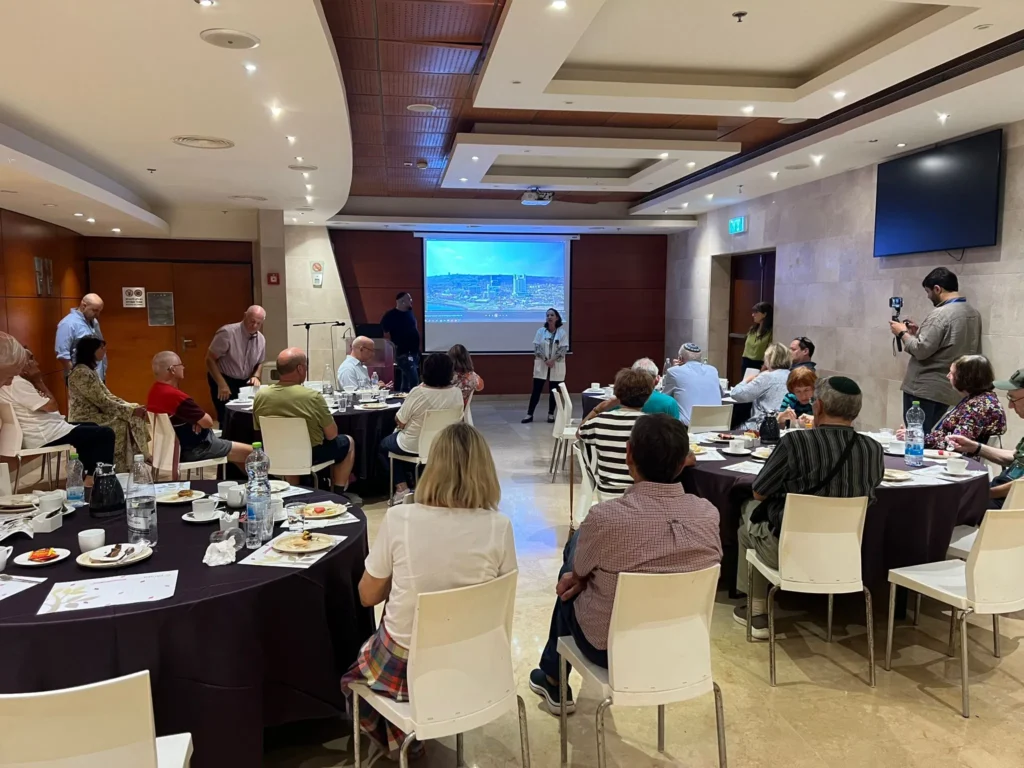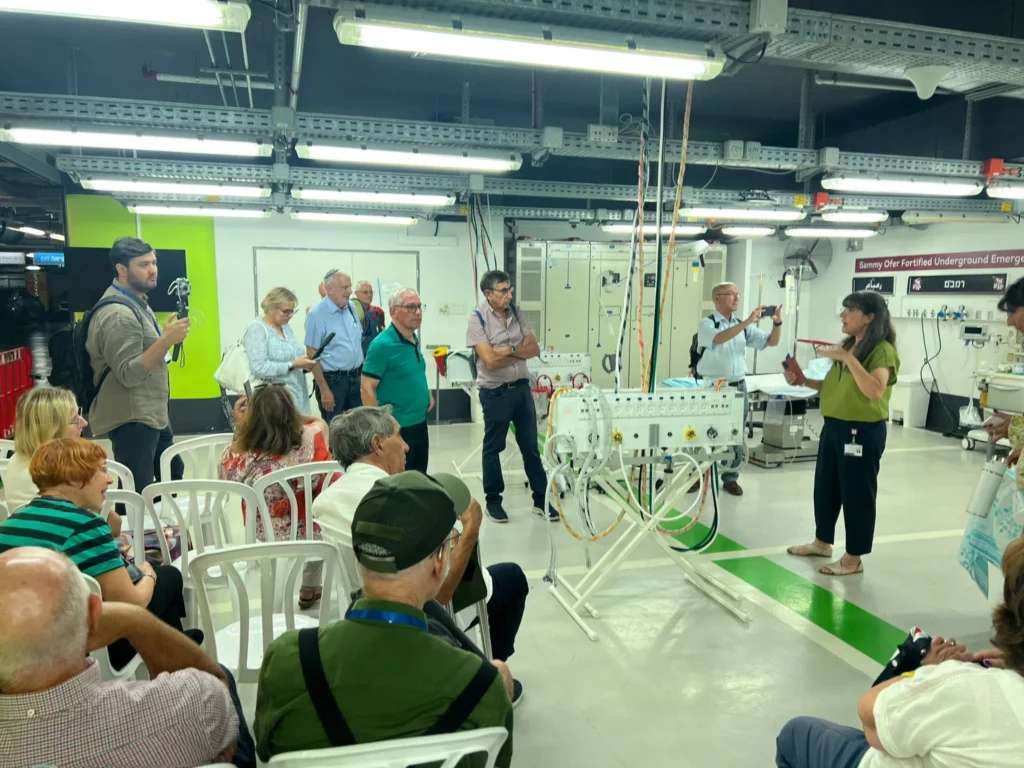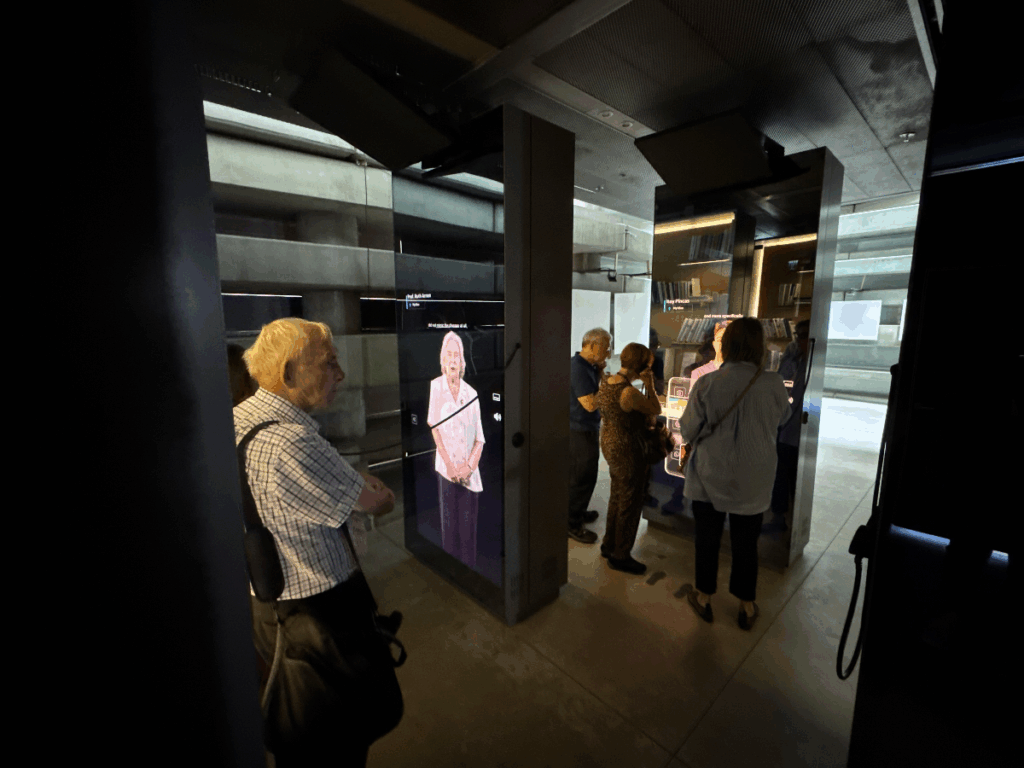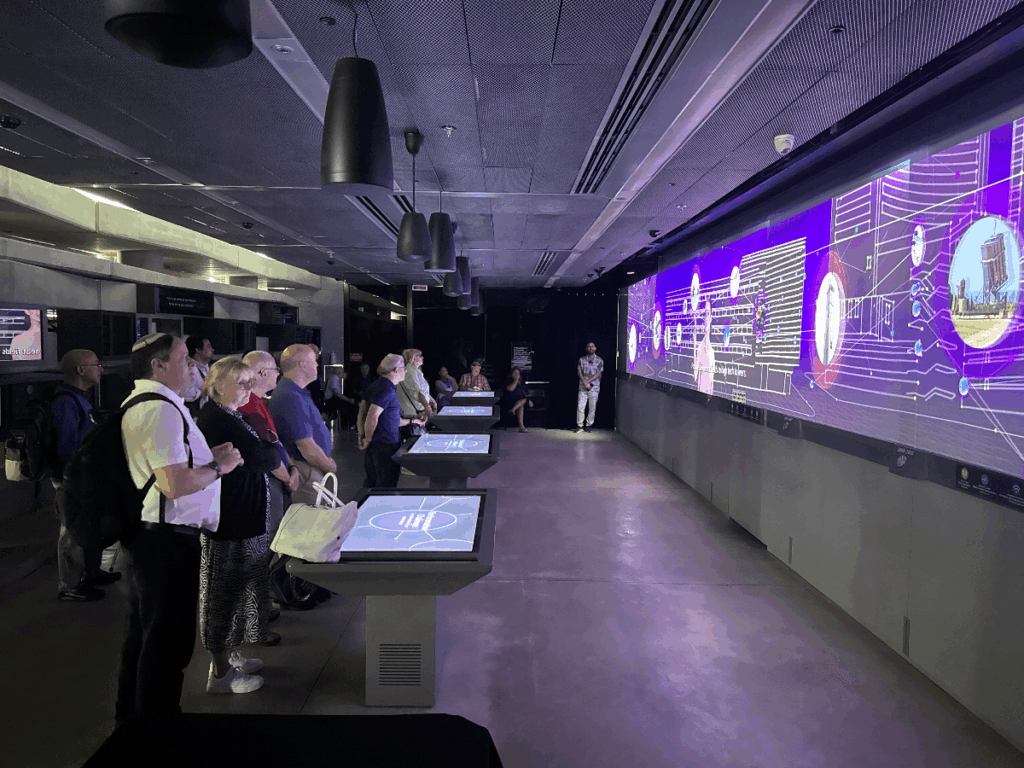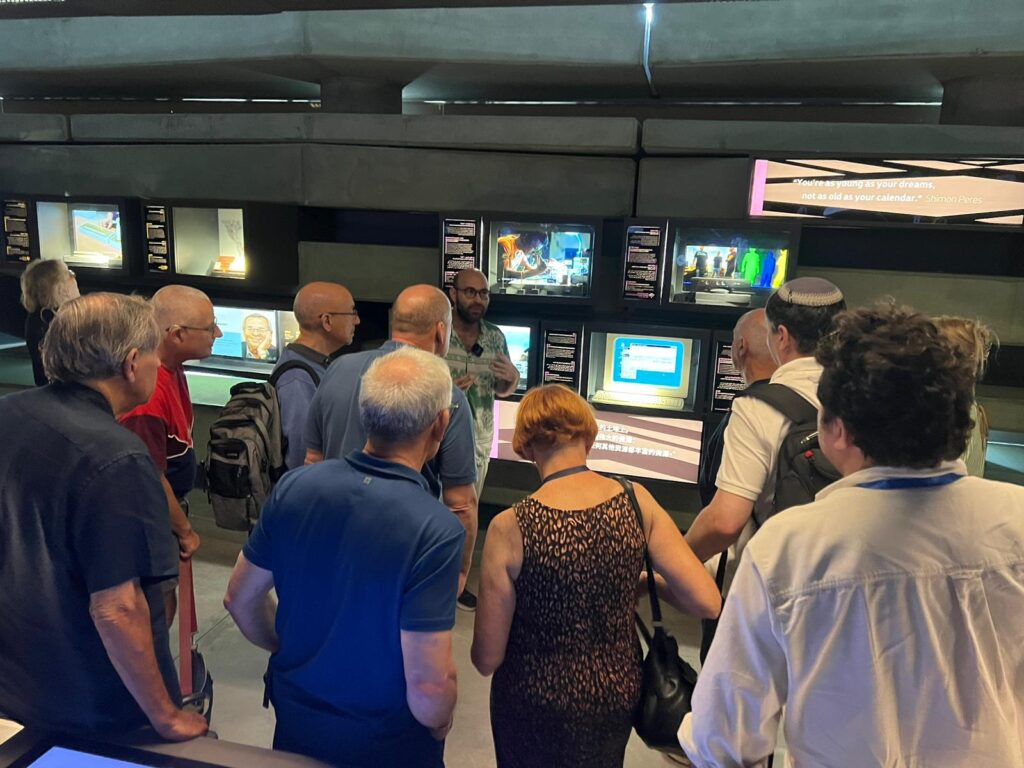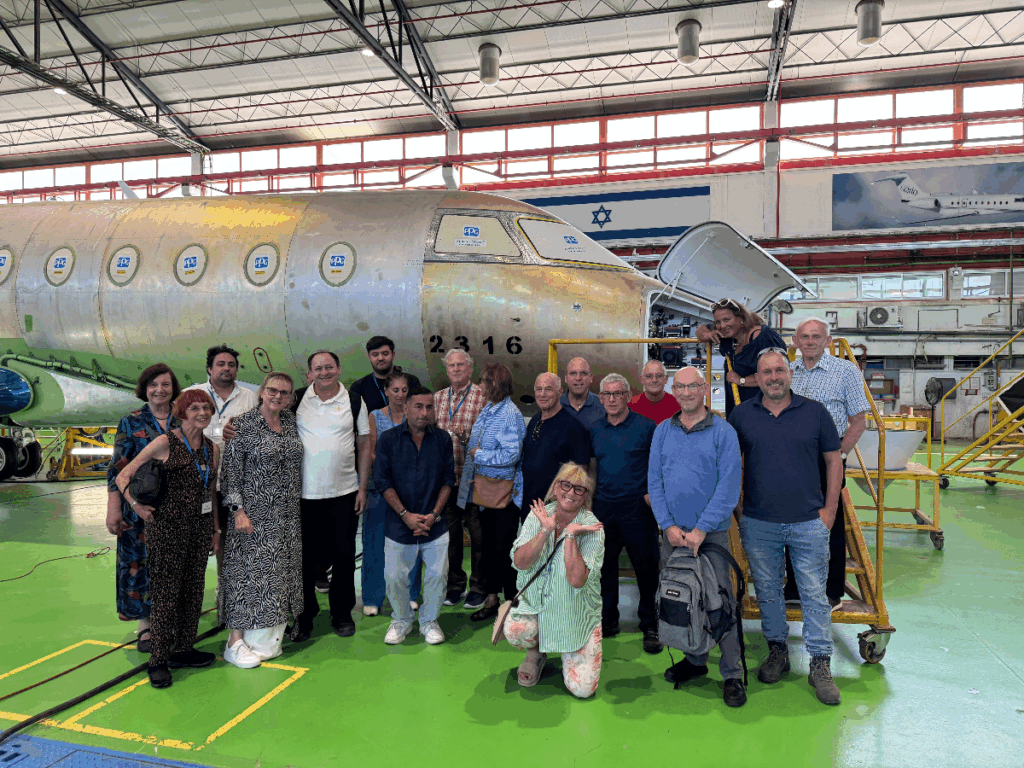September 2025 Trip updates
Welcome to the Technion UK Israel Trip September 2025 updates
Day 1
We are very excited to welcome you to the first day of our trip to Israel. Here is a short update on the events that took place today during our 1st day of travelling in Israel. Please feel free to forward this email to any friends or contacts that you think might be interested.
Ida and Alan opened the trip with a warm welcome, thanking participants for making the effort to be in Israel during such challenging times. She highlighted the tightly packed and meticulously planned itinerary, stressing the importance of punctuality and flexibility due to last-minute changes. The trip promises to be informative and inspiring.
Important updates included a strict no-recording policy at Meta and the cancellation of the Shura military base visit. Despite these shifts, Ida and the team have ensured an impactful programme, including meetings at the Technion and Rambam Hospital. Alan and Ida followed with reminders on logistics and the wide audience receiving trip updates. Introductions revealed a diverse and enthusiastic group, all eager to explore Israel and its innovations through the lens of the Technion.
Maayan Jaffe-Hoffman
We began the first morning of the trip with an in-depth and powerful briefing by Maayan Jaffe-Hoffman, Executive Editor of ILTV, who returned once again to offer a broad strategic overview of the current situation in Israel and the wider region. Speaking candidly and swiftly, Maayan set the tone for the next four and a half days, offering context to the ongoing war and the many fronts Israel is currently managing.
Her update opened with Gaza, where she detailed the heavy toll of the conflict – with over 900 IDF soldiers killed in nearly two years of fighting and 48 hostages still believed to be in Gaza, though only about 20 are thought to be alive. She noted that while Israel now controls around 70% of the Gaza Strip, efforts are concentrated on the remaining strongholds in Gaza City, with the aim of achieving full military control, albeit without plans for long-term reoccupation. Simultaneously, diplomatic efforts continue, most recently around a potential US-brokered deal involving the return of all hostages on the first day of a ceasefire. Maayan expressed scepticism about Hamas agreeing to such terms, given the complete loss of leverage it would entail.
She also highlighted the attack on Ramon Airport by a Houthi missile – the latest indication that, despite Israel’s recent elimination of key Houthi leadership, the group remains operational. She explained the broader Iranian influence behind such fronts, including the Houthis and Hezbollah, and reviewed the recent conflict with Iran, where claims of neutralised nuclear capabilities remain unverified.
Turning to Lebanon, she spoke about the fragile optimism stemming from Israel’s weakening of Hezbollah leadership and the Lebanese government’s stated intention to disarm militant groups. However, with no timetable in place, she noted this remains a watch-and-wait situation. In contrast, Syria has become a potential ally of sorts, with Israel taking on a protective stance toward the Druze minority there – a move Maayan described as significant.
In the West Bank, she discussed rising calls for Israeli sovereignty over Area C and the political complexities surrounding such moves. Maayan pointed out that both Palestinians and Israelis largely see the two-state solution as unviable, though international bodies, including the UN, continue to push for recognition of a Palestinian state. She warned that symbolic gestures by major Western powers could carry real diplomatic consequences.
Throughout, Maayan balanced strategic insights with a human perspective, reminding us that for many Israelis, the central priority remains the safe return of hostages. She acknowledged the psychological toll of the war, including widespread trauma and a frayed social fabric, particularly in the north where communities have not returned in the same way as in the south.
The session concluded with a lively Q&A, covering media misrepresentation, the role of Hamas-support within the West Bank, and challenges faced by Israel in managing both military and international diplomatic pressures. Maayan’s clarity and unflinching realism provided the group with a crucial foundation for understanding the complex landscape we are engaging with during this visit.
Visit of Meta

The group received a comprehensive overview of Meta’s evolving technological vision and its strong ties to innovation in Israel. They learned how Meta is transitioning from having only traditional platforms like Facebook and Instagram toward expanding into groundbreaking developments in AI and extended reality (XR), with the goal of reshaping how people connect, work, and experience the digital world and an enhancement of personal connection. These advancements include lightweight AI-integrated glasses, immersive virtual environments, and intelligent virtual assistants, all aimed at enhancing daily interactions through more natural and intuitive technology. Meta has 22 R&D centres around the world, and the biggest one outside of the U.S. and the UK, is in Israel.
Moovit
At Moovit HQ in Ness Ziona, the group was warmly welcomed by Ziv Kabaretti, the company’s Chief Product Officer and a Technion alumnus. He shared the fascinating origin story of Moovit, which was founded in 2012 by fellow Technion graduates inspired to build a public transport equivalent of Waze. Starting with no code and no funding, the team’s vision has grown into a global platform with nearly two billion users, spanning over 100 countries and 4,000 cities.
Ziv detailed Moovit’s foundational principle—that mobility is a fundamental human right—and the company’s mission to make public transport more accessible and seamless. Their core offering—plan, pay, and ride—enables users to navigate multi-modal journeys using buses, trains, bikes, scooters, and even taxis. A standout feature is their growing payment functionality, which is live in places like Israel and Rome and expanding into additional cities.
What began with city-specific data has evolved into a vast and interconnected system, now offering long-distance planning (e.g., London to Manchester). Moovit built the world’s most comprehensive transit data repository by creatively enlisting nearly a million volunteers to help map transit systems worldwide—a “Wikipedia of public transit.” This community effort enabled rapid global expansion, especially in areas with limited or inaccessible transport data.
He highlighted strategic collaborations with major platforms like Uber and partnerships with local authorities, through which Moovit offers tools, data insights, and even white-labelled apps. The company’s data powers transit information within the Uber app, and in turn, these partnerships enhance Moovit’s visibility and local relevance.
Moovit also emphasises accessibility, offering features tailored for users with disabilities, including enhanced voiceover support for the visually impaired. Looking ahead, the company is investing in green mobility solutions—potentially incentivising public transport use for carbon savings—and exploring AI interfaces, like a chat-based Moovit Companion, to further simplify route planning.
Ziv concluded with insights into the company’s evolving revenue model, which now includes both B2B and B2C streams, and affirmed Moovit’s commitment to being a truly global, inclusive mobility platform.
Briefing from Brig. General (Res.) Professor Jacob Nagel

Professor Jacob Nagel delivered a highly comprehensive and gripping session, offering rare insights into Israel’s national security landscape, its strategic doctrine, and his own substantial role across decades of defence leadership. With an illustrious background spanning over four decades in Israel’s elite intelligence unit 8200, the Ministry of Defence, and the Prime Minister’s Office, Professor Nagel detailed the challenges and shifts Israel faces, particularly following the events of 7 October.
He began by highlighting his tenure at the Technion and his leadership of the Advanced Defense Research Institute, which acts as a crucial bridge between Israel’s defence establishment and academia. This institute translates real-world security needs into technological innovations, fostering collaboration between the IDF, Mossad, ISA, and industry.
Professor Nagel shared that he chaired the decisive and crucial committee that embarked on a course that led to the development of the Iron Dome system back in 2007, which was developed by Technion graduates, despite widespread scepticism at the time. He also recently led two major strategic committees: one setting Israel’s defence budget and military build-up for the next decade, and another charting a national strategy for AI in civilian life.
The core of his presentation focused on Israel’s shifting defence posture. He spoke about the pre-October 7 strategy of containment and defence, advocating instead for a new doctrine rooted in offence and pre-emptive action, particularly regarding Hezbollah in Lebanon. He outlined Israel’s updated rules of engagement, now supported by international consensus, which enable the IDF to strike pre-emptively in response to imminent threats, even deep inside enemy territory.
On Iran, Professor Nagel issued a stark warning. He emphasised that Iran has always been and remains the single greatest threat to Israel, orchestrating instability throughout the region—from Gaza to Lebanon and Syria—while pushing forward with its nuclear ambitions. He described the Iranian regime as a “wounded animal,” making it especially dangerous. He also revealed details of Israel’s unprecedented retaliatory air operations deep into Iranian territory, including a twelve-day campaign, which should have been 14 days, that destroyed over half of Iran’s missile launch capabilities.
One particularly sobering insight came as Professor Nagel reflected on the failure to anticipate the October 7 Hamas attack. He candidly acknowledged that the intelligence community had access to indicators but did not act because the scenario seemed too implausible to believe. He likened this failure to a personal betrayal of Israeli citizens, calling it a mistake of belief rather than resources or capabilities.
Whilst noting the continued challenges with Hamas and Hezbollah, he also briefly addressed other regional dynamics, including the dire situation for the Druze community in Syria and Israel’s delicate balancing act with states like Turkey, Qatar, and Egypt.
In closing, Professor Nagel underscored the critical role of the Technion in sustaining Israel’s defence posture. While the Technion does not build systems, it educates the majority of engineers and scientists powering Israel’s defence innovation. He urged honesty in recognising the scope and limits of what each institution contributes, stressing that integrity in credit-taking is as vital as technological excellence.
This extraordinary session concluded with Professor Nagel inviting attendees to join his upcoming talk in London, promising further insights into both Israel’s security and the cutting-edge research at Technion.
Day 1 Album
Day 2
Visit to the Kotel and Mount Herzl
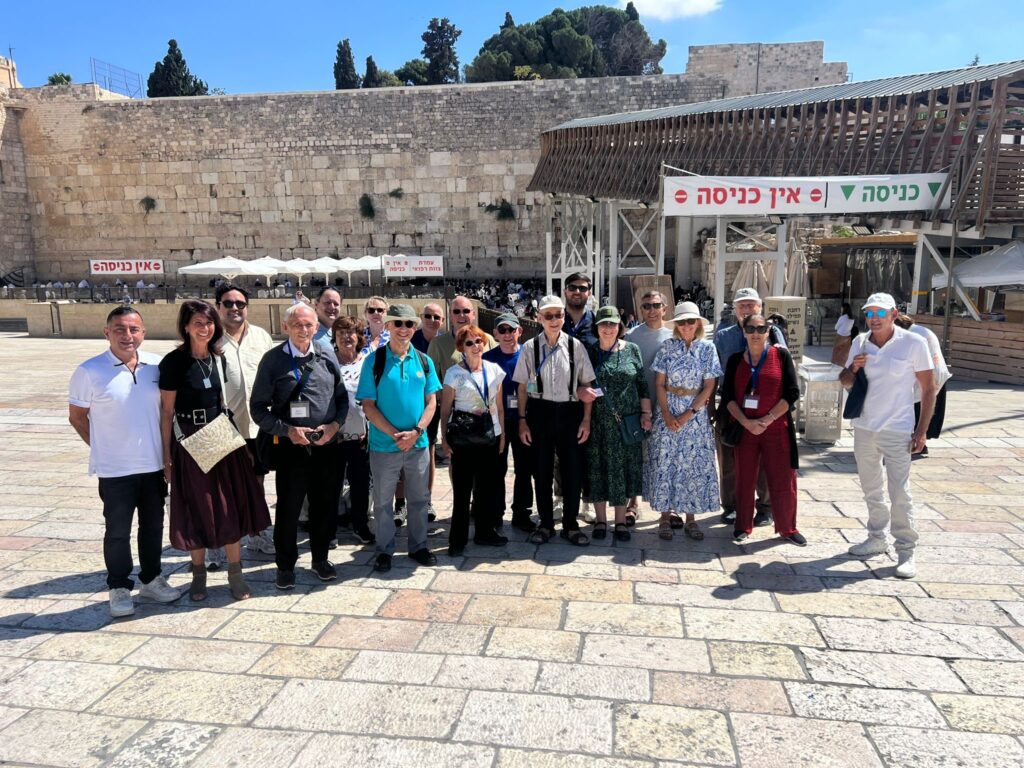
The group began the day with prayers at the Kotel, a moment of deep reflection made even more poignant by the tragic events unfolding nearby. A terror attack had taken place at the Ramot Junction bus stop in Jerusalem—on 8 September 2025—claiming six lives and leaving many others wounded. The sense of vulnerability and resilience was palpable. From the Kotel, the group continued to Mount Herzl, where they received a powerful and detailed account from Shlomit who is the education director for Mount Herzl, which is mainly looked after by the World Zionist Organisation. The visit to Israel’s national cemetery brought into focus the intersection of history, symbolism, and the modern-day sacrifices that continue to shape the nation’s story.
Shlomit. Education director for Mount Herzl
Shlomit began by highlighting Theodor Herzl’s passion for progress and innovation. Despite living in the late 19th century, Herzl had a fascination with gadgets, electricity, and the potential of science to shape the future—ideas embodied in his writings and preserved in personal belongings such as his telephone, now displayed at the Madatech Museum in Haifa. This admiration for modernity contributed to the debate over his final resting place. Although Haifa, home to the Technion, was initially considered, Ben-Gurion insisted that Herzl be buried in a location of deep symbolic significance.
In 1949, with Jerusalem divided, mainly under non-Jewish control and many historic Jewish sites inaccessible, Ben-Gurion selected an empty, elevated mountain on the western edge of the city. At the time, the site was outside the official boundaries of Jerusalem. But once Herzl was buried there, the map was redrawn to include the mountain, which thereafter became known as Har Herzl. The burial itself was deeply symbolic—Herzl’s coffin was flown from Vienna to Israel, circling Haifa in a gesture to honour the city’s earlier candidacy. In Tel Aviv, tens of thousands filed past his coffin overnight before it was driven to Jerusalem along the route of his historic 1898 visit.
At the funeral, 300 representatives from across Israel each brought earth from their cities, creating a collective burial in every sense. Herzl’s grave, stark and simple, carries only his surname—no first name or dates—because, as Shlomit explained, in 1949 no explanation was needed. His legacy was universally known. Facing his burrial place is the site of Israel’s annual central ceremony marking the transition from Yom HaZikaron to Yom HaAtzmaut, a setting that reinforces the mountain’s layered symbolism: vision, sacrifice, and national rebirth.
Shlomit led the group through the various sections of the mountain, explaining how the leaders’ cemetery was added in 1950 for prime ministers, presidents, and Knesset chairmen. She pointed out the graves of Rabin, Peres, and Golda Meir, who are buried with their spouses amongst other leaders. She also detailed the establishment of the military cemeteries, born of necessity after the 1948 war, when fallen soldiers had been buried in improvised locations. A discovery of a Second Temple-era burial cave on the site further anchored its suitability for Jewish burial. Today, Mount Herzl is the largest military cemetery in the country.
Among the most moving stories shared was that of Esther Cailingold, a young Orthodox Jewish teacher from northwest London who secretly joined the Palmach. She fought and died in the Old City of Jerusalem in 1948. Her poignant last words—refusing a cigarette on Shabbat as she lay mortally wounded—reflect her deep faith and idealism. Shlomit described her as a powerful role model and a symbol of the longstanding presence of religious women in Israel’s military history. When she died, she left a letter to be given to her family which was very common amongst Palmach fighters in which she wrote to her patents that she had lived a full life. She was 22 years old.
The tour then moved to a newly established section of the cemetery created during the ongoing war that began on 7 October 2023. Shlomit noted that over 900 soldiers have been killed, with more than a fifth buried on this mountain. The graves are not uniform in age—many belonged to reservists, fathers, and olim from countries such as Russia, Canada, and Ethiopia. Family-chosen tributes, flowers, photos, and stickers bearing personal mottos make each grave profoundly individual. Shlomit spoke about the army’s strict burial protocols, the use of coffins for fallen soldiers, and halachic rulings in cases where remains were minimal or symbolic.
Nearby is a growing memorial for victims of terror—Jews and non-Jews, in Israel and abroad. Shlomit explained that this area would host a major ceremony commemorating victims of the 7 October attacks shortly after Sukkot. She also noted the mountain’s architectural alignment with national institutions such as the Knesset and the Supreme Court, symbolising the vision of statehood and law under Herzl’s legacy.
As the visit concluded, the group passed the grave of Ze’ev Jabotinsky, another early Zionist leader whose reburial on the mountain was delayed until 1965 due to political disputes. His presence adds yet another chapter to the multifaceted story of Har Herzl.
This visit, led by Shlomit, was not only a walk through history but a profound reminder of the cost, complexity, and continuing relevance of the Zionist dream—made especially poignant in light of the lives lost just a day earlier in Jerusalem.
The Chaim Herzog Museum of the Jewish Soldier in World War II
The group visited the Chaim Herzog Museum of the Jewish Soldier in World War II, a new museum opened just a year and a half ago within the Armoured Corps compound at Latrun. The guide, Matan, welcomed everyone and explained that the museum tells the lesser-known story of the 1.5 million Jews worldwide who fought against the Nazis and their allies. Unlike many narratives in Israel that focus primarily on the Holocaust, this museum highlights Jewish bravery in combat across five thematic wings.
The tour began with a powerful video, the “Time Elevator”, transporting visitors back to 1939 and presenting Jewish soldiers from across the world who enlisted to fight. From there, the group descended into the first wing, dedicated to the early years of the war, with exhibits on Jewish soldiers in the British forces. Visitors explored interactive displays and stories of figures such as Chaim Herzog, Vera Atkins, Robert Stanford Tuck, and Eddie Myers, alongside Jewish servicemen from the Commonwealth.
Subsequent wings explored the contributions and sacrifices of Jews in the Soviet Army, where half a million Jews served and 40% did not return, with many decorated as heroes of the Soviet Union. Stories such as that of Yakov Kreizer and Polina Gelman, a decorated pilot of the “Night Witches,” were brought vividly to life. The American wing followed, featuring striking stories like that of Philip Goldstein, who proudly emblazoned “Jew Boy” on his fighter plane, turning an insult into a symbol of defiance. In America, the number of Jews who served in the army was 550,000. In Poland, there were 140,000 and in the UK the number was 60,000.
The narrative then shifted to Jewish partisans and resistance fighters, including the Warsaw Ghetto Uprising, presented through a dramatic holographic display. Visitors also learned about partisan struggles in the forests and the Bielski brothers’ remarkable story. The group watched a powerful film, which depicted scenes of Warsaw Ghetto fighters who knew that their lives would be ended very soon and the final words of the film were “We will die, but our lives will be lived by future generations of Jewish people.” – What a powerful line!
The final wing focused on the 40,000 volunteers from Eretz Israel who joined the British forces, later bringing their military expertise to Israel’s War of Independence. The tour concluded with a 360-degree panoramic film, showing how Jewish soldiers of World War II became the foundation of the modern IDF.
The guide emphasised that the museum is not only a place of display but also of remembrance, preserving the memory of Jewish soldiers worldwide. He encouraged visitors to contribute by registering names of soldiers in the museum’s online database, ensuring their legacy continues to be honoured.
Netanel Afek and Tzvi Michaelson
Rabbi Netanel Afek began by sharing his personal journey since 7 October. He described being called out of shul on Simchat Torah and immediately joining his unit in the Gaza envelope. For two months he served on the frontlines, securing the area, supporting civilians, and preventing further attacks. Later, he was invited into a special IDF rabbinate unit tasked with the difficult work of recovering fallen soldiers and hostages. He explained how these missions often involved dangerous conditions—collapsed buildings, tanks, and combat zones—and required meticulous care to ensure every detail was handled respectfully. He emphasised that this work is not just military duty, but a sacred mitzvah.
Netanel also described how he and his business partner transformed their skills in coaching and storytelling into a programme called Up to You. The initiative helps soldiers, bereaved families, and others affected by the war learn to share their personal stories in a meaningful way. The programme received an overwhelming response, with over 150 applicants for just 20 places. Since its launch, new cohorts have been formed, supported by donations, with the aim of giving voice to those whose lives were reshaped by the conflict.
Tzvi Michaelson then spoke about his own experiences. Immediately after 7 October, his unit was sent to the Lebanese border, where they lived in rough conditions—subsisting only on combat rations. He shared moving stories of comrades who brought unexpected strengths: one a chef who transformed meagre rations with his box of spices, another a logistics expert who somehow secured generators, fridges, and even a massage chair to boost morale.
Tzvi highlighted the vital role of families, recounting how his wife personally intervened to secure missing equipment for his unit. Her determination directly contributed to saving lives, as one of the recovered harnesses enabled a fellow soldier to detect and prevent a Hezbollah attack.
He went on to tell of the ambush in southern Lebanon in October 2024, in which four members of his unit—including close friends—were killed and six more were wounded. Despite this devastating loss, the surviving soldiers regrouped, supporting the widows and orphans through practical initiatives such as weekly help in their homes and communal activities like a group camping trip. Tzvi stressed the resilience and spirit of his comrades: their ability not only to fight but to rebuild and care for each other’s families.
Both speakers concluded with reflections on the wider Israeli spirit. They underlined the importance of solidarity—between soldiers, families, and also with supporters abroad. The presence of the group in Israel, they said, is itself a powerful act of strength and encouragement, showing that Jews worldwide stand together as one family.
David Horovitz, founding editor of the Times of Israel
David Horovitz, who is the founding editor of the Times of Israel, which reaches 75 million people each month and is published in 5 languages which are Hebrew, English, French, Arabic and Persian, joined the group for a tightly packed thirty-minute briefing and opened with immediate context: Israel had acknowledged carrying out an airstrike in Doha targeting senior Hamas figures. He noted Israel’s unusually swift claim of sole responsibility and weighed two readings of that speed—either high confidence in results or a desire to underline that the operation was exclusively Israeli—while stressing that, at the time of speaking, verified outcomes were still unclear. He also observed the information fog around early reporting, contrasting claims from Al Jazeera and Reuters, and reminding listeners that reliable independent journalism from Gaza is severely constrained.
He mentioned the air-strike and Qatar’s complicated role as mediator and broadcaster funder, and reflected on how any successful decapitation could both complicate and delay hostage negotiations in the short term, even as it might increase long-term pressure on Hamas. He added that reports of talks being suspended were already surfacing during his remarks, underlining the fluidity of events.
Turning to the national mood, he emphasised that Israel remains “trapped in the ongoing nightmare of 7 October”, with the south rebuilding but the country as a whole still in mourning. He cited the current count of forty-eight hostages held since the war’s outset (with at least twenty-six confirmed deceased and only an uncertain number believed alive), and framed the policy dilemma: whether sustained military pressure is the only route to bring them home, or whether an alternative path exists without ending the war.
Horovitz offered pointed criticism of Israel’s eleven-week halt to aid deliveries (March–May), arguing that it was both morally and practically counter-productive—hurting civilians rather than Hamas and handing the terror group propaganda leverage. He also challenged external misreadings of Hamas’s ideology, insisting its intransigence should not be underestimated.
He then widened the lens to the regional picture, describing the Iran front as the most consequential development since his last briefing. He recounted the pre-dawn nationwide alerts preceding Israel’s strike on Iranian missile command networks, explaining that the subsequent delay in launches owed to Israel having killed those authorised to give the fire orders. He underlined the lethal reality of later salvos—dozens of civilian impacts and multiple fatalities—and shared a stark vignette from Soroka Hospital to convey the human and logistical toll.
On domestic politics, he sketched a deeply divided Israel, highlighting coalition tensions over ultra-Orthodox exemptions from military service and cautioning against over-reading polls given how fast public sentiment can shift after major security events. Yet he ended where he began: with the resilience of ordinary Israelis, the capacity to absorb shocks and return to routine, and a plea for greater journalistic access—“not absolute, but certainly more”—so that outside audiences can see more of the reality on the ground. He commented that no other country in the world would probably react the same way as the Israeli population to such devastating situations and thanked the group for coming to Israel and showing support.
Day 2 Album
Day 3
Technion Visitor centre
Our first stop was the Technion Visitor Centre, where we were warmly welcomed by Rachel, a third-year reservist student in Data Science and Decision Making. From the moment she began, Rachel’s enthusiasm for the Technion and her pride in being part of such a prestigious institution were unmistakable. She guided us through the experience with clarity, humour, and genuine passion.
She began by giving us a comprehensive overview of the Technion campus, often described as a “mini-city.” With 18 faculties – including engineering, science, medicine, architecture, education, and humanities – and a student population of around 15,000, it’s a self-contained hub of academic life. She pointed out that about a third of the students live in campus dormitories, the highest ratio in Israel, and the rest either commute or live in nearby neighbourhoods. 5000 students live on campus itself the highest number of students living on any campus in Israel.
Rachel also introduced us to the Technion’s expanding international programme, which allows students to complete their first year in English while learning Hebrew, before moving into Hebrew-taught degrees in later years. She noted a growing interest from students in the US and Europe, particularly in light of recent events. Since October 7, all undergraduate degree courses and all postgraduate degree courses can be studied in English. Prior to that only about 15% of undergraduate degree courses could be studied in English.
In addition to academics, the Technion places a very strong emphasis on creating well-rounded individuals. Rachel shared her own experience as a third-degree black belt on the university’s karate team, explaining how extracurriculars and interdisciplinary friendships have enriched her student life. She also highlighted the range of sports and humanities courses students are required to take – from ethics to kayaking – all part of the institution’s mission to broaden horizons.
The visit included a short film showcasing the Technion’s defining innovations, from Nobel Prize-winning research to breakthrough technologies such as Voiceitt, an AI-powered speech app, and the robotic snake used in disaster rescue operations. Rachel then took us through a series of exhibits, including the astonishing Nano Bible – the entire Bible engraved on a tiny gold surface, just 20 nanometres thick. Only five exist in the world, and all were created at the Technion.
Even when an unexpected incident occurred during the film – one of the guests suffered a minor fall – Rachel responded with calm professionalism, quickly arranging support while ensuring the rest of the group continued the tour safely and comfortably.
Her energy, insight, and personal stories gave life to the Technion’s values of innovation, resilience, and community, making it a remarkable start to our journey.
Professor Aaron Ciechanover, Nobel Laureate in Chemistry
Professor Aaron Ciechanover, Nobel Laureate in Chemistry, provided an enthralling and personal account of his professional journey, groundbreaking scientific achievements, and the ongoing work at the Technion’s Faculty of Medicine. Having recently returned from Peru, where he taught modern molecular medicine to South American physicians, he warmly welcomed the group to the Technion and offered a rich narrative of his life’s work.
He described his initial pursuit of medicine driven by familial expectations, and his detour into biochemistry—where he truly found his passion—before completing his military service as a naval combat physician during the Yom Kippur War. His scientific path flourished when he began his PhD under Avram Hershko, with whom he later won the Nobel Prize. Their discovery centred on how the body disposes of damaged proteins—a fundamental process now recognised as crucial in understanding diseases such as cancer, Alzheimer’s, and Parkinson’s. This discovery has spurred a multibillion-dollar pharmaceutical industry, with numerous drugs now based on this protein degradation mechanism.
Professor Ciechanover spoke about his time at MIT, the importance of developing scientific independence, and his return to Israel to continue his impactful work. He described his lab’s current efforts in developing a novel cancer drug—remarkably different in mechanism from traditional chemotherapy—and shared his views on the Technion’s unique role in shaping Israel’s scientific and technological prowess. He highlighted the institution’s foundational role in Israel’s survival and success, stressing that its contributions extend far beyond academia into the fabric of national infrastructure, security, and innovation.
He also provided insights into Israel’s healthcare system and medical education, including the challenges of physician shortages, the integration of Arab students, and the evolving structure of medical training. He candidly criticised recent political developments in Israel, which he feels have prompted an exodus of skilled professionals, jeopardising the country’s intellectual and economic core.
The visit concluded with a touching showcase of his Nobel memorabilia, including his medal and diploma, which he donated to Israel’s National Museum of Science and Technology for educational purposes. This thoughtful gesture, he explained, was intended to inspire future generations, a sentiment that encapsulates his lifelong commitment to science and public service.
Yael Shachor-Meyouhas
During the group’s visit to Rambam Health Care Campus, they were welcomed by a senior physician who also serves as the deputy director of the hospital. With nearly 25 years of experience at Rambam, she brought a unique perspective as both a paediatrician and an expert in infectious diseases. Her dual roles—managing all physicians and overseeing emergency preparedness—have placed her at the heart of the hospital’s response to major events, from COVID-19 to recent wartime challenges.
Rambam, the largest hospital in northern Israel, is a crucial tertiary referral centre serving over two million people and twelve neighbouring hospitals. Strategically located in Haifa, it is not only a medical facility but a national strategic asset, operating in collaboration with the IDF, UN, and even the US Navy. One of its unique attributes is its deeply rooted cultural pluralism, with patients and staff from all religions working side by side, especially evident during times of crisis.
The group learned about Rambam’s impressive contributions to medical innovation. Highlights included the hospital’s pioneering use of an MRI-guided focused ultrasound to treat essential tremors—transformative for patients unable to perform basic tasks like writing or drinking. The hospital also played a significant role in the early development of technologies like capsule endoscopy and continues to drive innovation through its 3D printing lab and partnerships with institutions like the Technion and the University of Haifa.
A particularly striking aspect of the visit was the explanation and footage of the Sammy Ofer Fortified Underground Emergency Hospital. Built initially as a hospital and secondarily used as a parking facility, this space can transform in hours into a fully functional hospital capable of receiving up to 2,000 patients. It was activated multiple times, including during the COVID-19 pandemic and the recent Swords of Iron conflict. Staff acted swiftly and efficiently, relocating departments, providing uninterrupted care, and even operating a maternity ward underground where 170 babies were born during the crisis.
The speaker also emphasised Rambam’s leadership in trauma care, treating more trauma patients than any other hospital in Israel, due in part to road accidents and regional violence. Their emergency preparedness, honed since the Second Lebanon War, has become a model studied globally.
The session concluded with a powerful video and discussion showing the hospital’s seamless transition into emergency mode during the October 2023 conflict, highlighting the dedication of staff, logistical challenges like clearing the parking lot, and the hospital’s unwavering commitment to saving lives under any circumstances.
Rambam labs tour
Dr. Eyal Bercovich, Deputy Director, Medical Imaging, Director, CT Unit
The Deputy Director of Medical Imaging at Rambam, shared a compelling presentation on the critical challenges and innovative solutions in the field of medical imaging, particularly the role of AI in transforming diagnostics. He highlighted a global crisis in radiology: the exponential growth in imaging studies and image complexity is overwhelming healthcare systems, with no current solution fully addressing this burden.
Rambam, leveraging its strategic location between the Technion and Israel’s high-tech ecosystem, is actively addressing this issue through close clinical-technological collaboration. A key example presented was a case involving a 16-year-old boy with a delayed diagnosis of a bone tumour. Initial X-rays failed to detect abnormalities, which even experts may have missed. However, Rambam and the Technion co-developed an AI algorithm that can now flag such abnormalities much earlier, even with limited data. This tool has achieved state-of-the-art sensitivity and is poised for deployment in clinics to aid early detection, especially in rare paediatric cancers.
He emphasised that these AI solutions are built on clinical insight, substantial datasets (like the 90,000 CT scans performed annually at Rambam), and close collaboration with data scientists. A significant challenge remains the laborious task of image annotation, which is both time-consuming and expensive. Rambam has adopted a tiered annotation system and is even developing AI tools to automate this step.
He acknowledged the prevalent hype around AI and stressed the importance of developing tools that provide real clinical value rather than merely academic outputs. Projects are vetted not just for innovation but for their applicability and reliability in real-world medical settings.
He also addressed the broader implications of AI in medicine, noting that while AI will not replace clinicians in the near term, it will require a shift in how physicians work—transitioning from decision-makers to interpreters and validators of AI-generated insights. Rambam is already preparing for this transition, with plans to integrate AI literacy into medical education.
He also spoke on the uniquely collaborative culture in Israel, where informal networks between hospitals facilitate data sharing for rare conditions like paediatric bone tumours. While not systematised, these personal relationships enable swift and effective research collaboration.
In response to concerns about AI replacing jobs, he predicted a transformation in medical roles rather than job loss, especially among knowledge workers like radiologists. Patients increasingly arrive informed—or misinformed—by tools like ChatGPT, requiring doctors to be well-versed in these technologies to maintain credibility and deliver accurate care.
Overall, his talk painted a realistic yet hopeful picture of AI’s future in healthcare, grounded in practical solutions, strong academic partnerships, and a deep commitment to improving patient outcomes.
Dr Irena Papier—COO of the TERA project
At Rambam, Dr Irena Papier—COO of the TERA project and a seasoned nurse specialising in clinical nutrition—delivered a comprehensive and engaging overview of this groundbreaking collaboration between Rambam Health Care Campus and the Technion. With over 30 years of experience at Rambam and a PhD in nursing, she brings a unique blend of clinical insight and research expertise to her leadership role.
Irena explained that TERA—launched in 2022—serves as the connective tissue between two of Haifa’s major institutions: Rambam, with its 36 clinical departments and vast patient data resources, and the Technion, home to 22 faculties of academic excellence. Named for both its institutional roots and the sheer scale of data it engages with (“tera” as in terabytes), TERA’s mission is to accelerate the use of artificial intelligence in medicine by providing a secure, end-to-end research environment.
We heard how the initiative supports more than 30 active projects spanning a wide range of clinical fields, from ICU decision-making and kidney injury to pancreatic cancer, obstetric predictions, and nutritional care. Each multidisciplinary team must include at least one clinician and one scientist, fostering genuine collaboration between medical and academic professionals.
TERA also plays a vital role in funding and education—offering local and international research grants, PhD scholarships, and partnerships with institutions abroad, such as recent collaborations with French teams. Dedicated lab spaces at Rambam allow students and researchers to work in cyber-secure conditions with access to anonymised clinical data, imaging records, and biospecimens.
Positioning Israel as a potential world leader in medical AI, Irena concluded with an inspiring vision: with the right support, infrastructure, and expertise—which already exist in abundance—there is nothing stopping Israel from becoming a true “medical AI nation.”
Rambam Hospital’s underground facility
Next, we heard a comprehensive and deeply moving overview of Rambam Hospital’s extraordinary underground facility – the largest fortified hospital of its kind in the world. This impressive structure was conceived in the aftermath of the 2006 Second Lebanon War, when over a hundred missiles struck within a kilometre of the hospital. Determined that such vulnerability would never be repeated, the hospital’s leadership – led by Professor Rafi Beyhar – pursued an ambitious vision: to build an underground space that would serve both as a parking facility in peacetime and a fully operational hospital in times of crisis.
What followed was a remarkable feat of engineering and persistence. Located 16.5 metres underground and nine metres below sea level, the facility spans three vast floors of 20,000 square metres each. Constructing it was no small task – the team had to contend with rising seawater, which required around-the-clock pumping for two years, and navigate sensitive land negotiations involving local monasteries. Yet, they succeeded in creating a space that can accommodate up to 2,000 beds and is fortified against both conventional and non-conventional weapons, including chemical and biological threats.
Each level is equipped with state-of-the-art infrastructure: concealed panels alongside the walls contain essential medical utilities, including oxygen, electricity, water, and communications, allowing for rapid conversion into patient care areas. The design enables partial activation, with sections sealed off for up to 500 patients at a time, supported by advanced air filtration systems made by the Beit El community.
The underground hospital has been activated during key moments in recent history – during the COVID-19 pandemic, and again after October 7, when it was prepared within 36 hours by 300 soldiers and medical staff. It later operated continuously for a month and a half during escalations with Hezbollah. During these times, it not only served Rambam’s own patients but also absorbed critical cases from nearby hospitals, such as Carmel and Freeman, including patients on dialysis and those requiring ventilation.
The facility is entirely self-sufficient for up to 72 hours, with dedicated supplies of food, water, medications, and its own electricity generators. It even includes on-site daycare for staff children, ensuring that essential personnel can continue working during emergencies.
At the heart of this operation is a state-of-the-art command centre, where hospital management coordinates responses alongside representatives from the IDF, Magen David Adom, Haifa municipality, and police forces. Real-time data and surveillance across the hospital grounds are available through a bespoke dashboard developed by Rambam’s own IT team.
Perhaps most inspiring is the spirit of unity that defines Rambam. More than 70% of its staff are non-Jewish, and the hospital serves a highly diverse patient population. During times of crisis, this coexistence only strengthens, with staff from all backgrounds working side by side in pursuit of a single goal: saving lives.
This tour left a lasting impression, not just for its technological sophistication, but for the powerful example it set in preparedness, resilience, and shared humanity.
Professor Maya Davidovich-Pinhas
Next, we heard from Professor Maya Davidovich-Pinhas, who leads the Food Materials Engineering Laboratory within the Faculty of Biotechnology and Food Engineering. She began with a brisk overview of the faculty: the Technion is Israel’s only university offering a dedicated food engineering programme (distinct from food science or nutrition), with approximately 19 academic staff and 350 undergraduates. She also highlighted two major initiatives—the newly established Carasso Centre for Food Innovation, aimed at strengthening ties with industry, and the cross-faculty Sustainable Alternative Protein Centre (PRC), which is rapidly expanding lab capabilities under the leadership of Prof Livni.
Her research talk, “Harnessing Molecular Architecture to Design Fat Alternatives”, made a compelling case for why fat, often overshadowed by protein, is critical for flavour release, creaminess and juiciness—owing to how triglycerides crystallise and melt. She noted that while trans fats have largely been eliminated from the food system, the bigger nutritional tension now lies between the textural benefits of saturated fats and the health advantages of unsaturated oils.
To address this, her lab is pioneering oleogels—structured liquid oils rich in unsaturated fats, transformed into solid-like matrices using edible gelators. These deliver the functionality of butter or tallow while retaining better nutritional profiles. Building on this, they have developed bigels—hybrid oil-and-water gels—enabling fat and protein to be co-engineered. By experimenting with chickpea, potato and pea proteins, adjusting oil:water ratios, and using enzymatic cross-linking (transglutaminase), her team can achieve textures ranging from firm to spreadable. Microscopy reveals oil droplets embedded within a protein matrix, and in tasting trials, a plant-based “emulsified sausage” prototype with ~15% protein demonstrated healthy fat content and realistic frying performance.
An engaging demo showcased how their bigel microstructures could mimic local soft cheeses. By manipulating salt and phase ratios, they moved seamlessly from crumbly, feta-like textures to smooth, spreadable formats—pointing to a promising path for clean-label, lower-saturated-fat cheese alternatives that still offer the bright white appearance consumers expect.
She concluded with early findings from a Good Food Institute-funded collaboration with Prof Marcelle Machluf (tissue engineering) and a catalysis expert. The joint project involves growing cultured muscle cells on edible microcarriers and combining them with protein-coated fat particles designed in her lab to produce ground-meat-style prototypes. Initial frying tests showed promising textures—though flavour development is ongoing. Prof Machluf has since launched a start-up, Metafora, to take this work forward. The key takeaway: for plant-based and cultured foods to succeed, designing the right fat structures is just as vital as finding new proteins.
Eitan Yaakobi
Eitan gave a deeply engaging presentation that offered a dual perspective into both cutting-edge scientific research and a premier academic programme. He began by welcoming the group to the Technion on a particularly symbolic day—the university’s centennial celebration—before diving into his primary areas of work.
In the first half of his talk, Eitan introduced his research in information theory, specifically in the field of data storage. He shared fascinating insights into the evolution of storage technologies, tracing a journey from the first IBM hard drives of the 1950s to today’s massive cloud infrastructures. However, he questioned the sustainability and scalability of current storage solutions, especially as global data generation continues to grow exponentially. This led to the innovative focus of his lab: storing digital data in DNA. Highlighting its tremendous storage density, durability, and low energy requirements, he explained how his team encodes digital files into the four DNA bases—A, C, G, and T—and how they work to ensure data integrity through sophisticated algorithms and error-correction methods. Though the process involves collaboration with biologists and chemists, Eitan’s own contribution is in the theoretical and algorithmic domain. He is also spearheading efforts to commercialise this technology, in partnership with a European Union consortium.
In the second part of his talk, he spoke passionately about the Technion Excellence Program, which he heads and is also an alumnus of. Established in 1992, the programme seeks to identify and nurture the most outstanding students—those he refers to as “diamonds”—and give them the tools to become future leaders in academia and industry. Students in the programme begin research from day one, and many graduate with multiple publications. He shared inspiring stories of alumni who have achieved exceptional success at remarkably young ages, such as completing PhDs by the age of 21 and founding leading AI companies. One such alumnus, Dean, recently made a generous contribution to the programme through his company Descartes, leading to its renaming as the Technion-Descartes Excellence Program.
He concluded by expressing deep pride in the alumni network and the transformative impact the programme continues to have.
Following his talk, we heard from Raviv, a third-year student in the Excellence Programme at the Technion, who gave a passionate and heartfelt insight into his journey. Now entering his fourth year, he is studying electrical engineering and mathematics—a unique and prestigious combination made possible by his participation in the programme. He emphasised the programme’s research-oriented approach, highlighting that from the very first year, participants are encouraged to explore and develop their academic interests through hands-on research. He reflected on his experience both as a student and as a course tutor, describing the excitement of seeing first-year students enthusiastically engage in research, code writing, experimentation, and testing.
Beyond academics, he spoke warmly about the community spirit fostered within the programme. It was described as a “highly intensive family”—supportive, collaborative, and knowledge-sharing, with more senior students mentoring newcomers, continuing a cycle of learning and encouragement. Extracurricular activities, including music events and trips, also help create this tight-knit environment.
The demanding nature of the programme was not understated—entry is highly selective, and staying in the programme requires consistent excellence. Yet, the rewards are immense, with some students even publishing research by their third year. The dedication and support from faculty, particularly Eitan who manages both the programme and a demanding role, were also praised. His potential visit to the UK was mentioned as something to look forward to. The event concluded with heartfelt thanks and anticipation for the evening ahead, despite a long and full day.
Visiting a Druze village in the north of Israel and enjoying a traditional Druze meal
Tonight’s final stop was in a Druze village, the smallest in Israel with just under 900 residents. Our host, Wasim, welcomed the group warmly into his home, describing it as a privilege to share his village, his family and his experiences. He introduced each family member with pride: his father, once a soldier in the Druze battalion of the IDF; his mother, a long-serving kindergarten teacher who also holds a second degree in industrial engineering; his brother, now serving in the Israeli Prison Service; and his sisters, one working in biotechnology and the other in pharmaceuticals. He also spoke of his brothers-in-law, one a software engineer and the other a regional manager in the Ministry of Agriculture. The introductions set the tone for a heartfelt evening where the family’s hospitality reflected the Druze tradition of warmth and openness.
Wasim went on to speak about the challenges facing the Druze community today, expressing solidarity with hostages held in Gaza and with their kin in Syria, particularly following the recent violence in Sweida. He then gave some background to village life: a quiet place with limited resources for young people, such as libraries or sports facilities, but an ideal setting for raising families. The school system runs until ninth grade, after which children must travel to nearby towns for high school. Despite these challenges, the sense of identity and loyalty among the Druze remains strong. Wasim highlighted that although Druze make up less than two percent of Israel’s population, they are deeply integrated into society, contributing to education, technology, medicine, and public service, with one of the highest army enlistment rates of any community. He also spoke of the balance between tradition and modernity within Druze society, with some families following religious customs closely while others live more secular lives, yet all united by honesty, hospitality, and a deep sense of belonging.
Sharing his personal story, Wasim described growing up in the mountains of the Galilee and his journey to the Technion in Haifa, where he studied information systems engineering. His career path led him into education, entrepreneurship and AI, with a focus on inspiring younger generations. He recalled meeting his close friend Amir, also a Technion graduate, during their first semester of algebra, a friendship that grew into a lifelong partnership in work and personal life. Their story, he explained, reflected the Technion’s role not only as an academic institution but also as a place that fosters enduring human connections.
We also heard from current Druze students. Asil, in his first year at the Technion, is enrolled in the elite Psagot programme, completing two degrees in software engineering and computer science in just four years. He spoke about growing up in his village, the historic ties of Druze communities to Israel, and the challenges of adapting to life at the Technion, particularly with Hebrew as his third language. He also explained the meaning of the Druze flag, with its five colours representing the core prophets of their faith. Benjamin, another student, described life in his village near the Lebanese border, where his family endured sirens and rocket fire during the war but chose to remain in their home. He spoke movingly about the resilience of his community, the growing number of Druze students at the Technion, and his own aspirations to serve in the army and contribute to Israel’s progress.
The evening ended with an introduction to Druze cuisine, guided by Wasim’s mother. Guests enjoyed a generous spread that included salads, stuffed cabbage, vine leaves with rice, mansaf, hummus, and the famous Druze pita. Around the table, conversations flowed freely, with visitors sharing their own stories of studying engineering in London decades earlier, memories of early computer languages such as Fortran, and reflections on how opportunities for women in science and technology have evolved. It was an evening rich in hospitality, history, and connection – a fitting close to a remarkable day.
Sawsan’s speech
Sawsan delivered the closing address of the day with an emotional and deeply unsettling account of the ongoing atrocities facing the Druze community in Sweida, Syria. She began by introducing her background as a psychologist and academic, holding two PhDs and extensive research experience focused on minority groups in Israel, particularly the Druze and Muslim communities. Drawing on both professional insight and personal connections, she offered a stark and harrowing portrayal of the brutal violence inflicted by Syrian regime forces and affiliated extremist groups such as ISIS and HTS.
She explained how the Druze community in Syria, though historically loyal to their land, refused to continue serving in Assad’s army in response to the regime’s growing repression. This defiance led to horrific retaliations—mass killings, abductions, and the complete destruction of villages. The speaker shared graphic and deeply distressing examples of these atrocities: infants murdered, women raped in front of their families, and children left orphaned and traumatised. One especially chilling account described two young sisters being forced to walk through the blood of their parents after witnessing their execution.
She reported that 36 Druze villages have been entirely eradicated, and the province of Sweida has now been under siege for nearly two months with no access to humanitarian aid. Over 228,000 people have been displaced, with many dying due to a lack of basic medical supplies. There are currently 103 women and over 550 men held hostage—many facing sexual violence, including children. The speaker described declarations from extremist clerics legitimising the treatment of Druze women as “sabaya” (war spoils), echoing the atrocities once faced by the Yazidis.
In a powerful conclusion to her address, she expressed deep frustration over the silence of the international community, noting that Israel remains the only country offering any tangible support—limited though it may be. Her final plea was urgent: to raise awareness, to advocate for humanitarian corridors, and most importantly, to do something for the children of Sweida—those who have survived but have lost everything. She shared her dream of establishing an online school to help restore a sense of future for these children, many of whom are without families, homes, or any access to education.
It was a devastating and moving way to close the day’s programme, leaving the group visibly shaken and determined to explore ways they might help. She asked the group to try to help in any ways that they could.
Day 3 Album
Day 4
Discussion panel with four IDF Soldiers from the spokesmen unit of the IDF
The group received a deeply personal and multifaceted briefing from four speakers: Oria, Ido, Gili, and Zack, each sharing powerful accounts of their service in the IDF and their roles in Israel’s public diplomacy efforts.
Our first soldier, shared a harrowing first-person account of the October 7th attack from her perspective as a young soldier stationed near the Nova party site. Woken not by sirens but by explosions, she initially mistook the noise for a thunderstorm until chaos unfolded. She described the confusion, fear, and her instinct to protect those around her—holding the door of the safe room shut, even as armed terrorists stormed the base. Her bravery, raw vulnerability, and trauma, including recovering memories of that day, painted a vivid picture of the psychological and physical toll. Remarkably, after a brief recovery period, Oria returned to her base and now works in the IDF’s public diplomacy office, driven by a sense of duty to share her and her friends’ stories.
Our second soldier, a lone soldier originally from Baltimore, spoke about his transformative journey from disinterest in Judaism to making Aliyah and joining the IDF. Initially aspiring to be a combat soldier, he was redirected—against his wishes—into the IDF’s Spokesperson’s Unit, where he now helps liaise with international delegations. He shared the emotional disconnect he experienced upon returning to the US, particularly with non-Jewish friends who distanced themselves due to his service. His story highlighted the growing gap between Israelis and the wider diaspora, and the psychological isolation felt by those bridging both worlds.
Our third soldier, who served in combat engineering, recounted the abrupt transition from training into live operational duty during the October 7th attacks. Though not stationed directly in Gaza, his unit faced threats and was later deployed both to the northern and southern fronts. He gave insight into the intense physical and emotional demands of combat service, the camaraderie with fellow soldiers, and the moral complexities of encountering civilians amid conflict. After sustaining health issues, he transferred into the Spokesperson’s Unit, determined to continue contributing despite no longer serving in a combat role.
Our fourth soldier, is acknowledged as a senior figure in the public diplomacy effort. He provided structural insight into the Spokesperson’s Unit, explaining its branches—from the press desk to digital media and diplomatic delegations. He and the others candidly addressed participants’ frustrations about Israel’s global messaging, particularly around October 7th, acknowledging the structural, legal, and ethical limitations they face. This included delays in public responses due to the need for verification and the respectful decision not to publicise graphic footage without families’ consent.
The speakers also engaged thoughtfully with challenging questions about Israel’s international image, limitations in public diplomacy, and the emotional and political implications of serving in such roles. The conversation reflected both the strength and vulnerability of young Israelis on the frontlines—not only of physical defence, but also in the global battle for narrative and truth.
Private tour of the Peres Centre for Peace and Innovation
The group visited the Shimon Peres Centre for Peace and Innovation, where they were taken on an engaging and thoughtful journey through the past, present, and future of Israeli innovation. The visit began with a short introductory video, followed by a hands-on experience with interactive holograms featuring 22 prominent Israeli innovators. These figures, representing diverse fields—from medicine to social impact—shared personal stories, challenges, and words of advice, illustrating the breadth of Israeli ingenuity.
Among those highlighted was Professor Hossam Haick from the Technion, renowned for his development of the electronic nose, a groundbreaking diagnostic tool. The Technion’s contributions were repeatedly acknowledged, with at least 14 out of the 24 innovations presented in one exhibit attributed to the institution, underlining its significant role in Israel’s innovation landscape.
The tour also brought attention to impactful social innovators like Adi Altschuler, who founded “Memory in the Living Room” and “Wings of Krembo”—projects fostering Holocaust remembrance and inclusive youth programming, respectively. These stories powerfully underscored that innovation isn’t confined to technology; social transformation, too, is an essential part of Shimon Peres’s vision of “tikkun olam”—repairing the world.
The group was then guided to a replica of Peres’s office, where they learned about his personal journey, values, and international recognition, including the Nobel Peace Prize and the U.S. Presidential Medal of Freedom. A particularly poignant moment came with reflections on Peres’s funeral, which drew global leaders including Mahmoud Abbas, emphasising the respect he commanded across political divides.
The next segment featured a historical timeline of Israeli innovation, highlighting how necessity—from water scarcity to national security—sparked advances across sectors. The group saw how early linguistic and academic foundations (like the revival of Hebrew and the establishment of the Technion) laid the groundwork for later breakthroughs in medicine, agriculture, and technology, including the invention of the USB flash drive and instant messaging via ICQ.
In the futuristic “time capsule” experience, participants used VR headsets to explore possible solutions to humanity’s looming challenges: population growth, resource scarcity, transportation, and health. The experience was both entertaining and thought-provoking, with examples such as 3D printing of food and even human organs—technologies already in development in Israeli institutions like Tel Aviv University.
Finally, the group toured the startup gallery, where they encountered promising ventures such as Nano Ghost, which targets cancer cells using stem cell “ghosts”, and UBQ, which recycles waste into thermoplastics used by global brands like McDonald’s. The latter’s moving story—having continued operations even after the 7 October attacks—stood as a testament to resilience and commitment to progress under adversity.
The visit concluded with a reflection on why the Centre is located where it is: on the very site where Shimon Peres first set foot in Israel as a young immigrant, and fittingly, also where he delivered his final speech. The symbolism of that location—where his life’s journey began and ended—left a deep impression on the group, wrapping up an inspiring, educational, and emotionally resonant experience.
One very interesting element of the extent to which the Technion was featured throughout this museum. In one of the rooms, where the museum selected 24 of the most important inventions / developments in Israel’s history, 14 of them emanated from the Technion.
Visit to Israel Aerospace Industries (IAI)
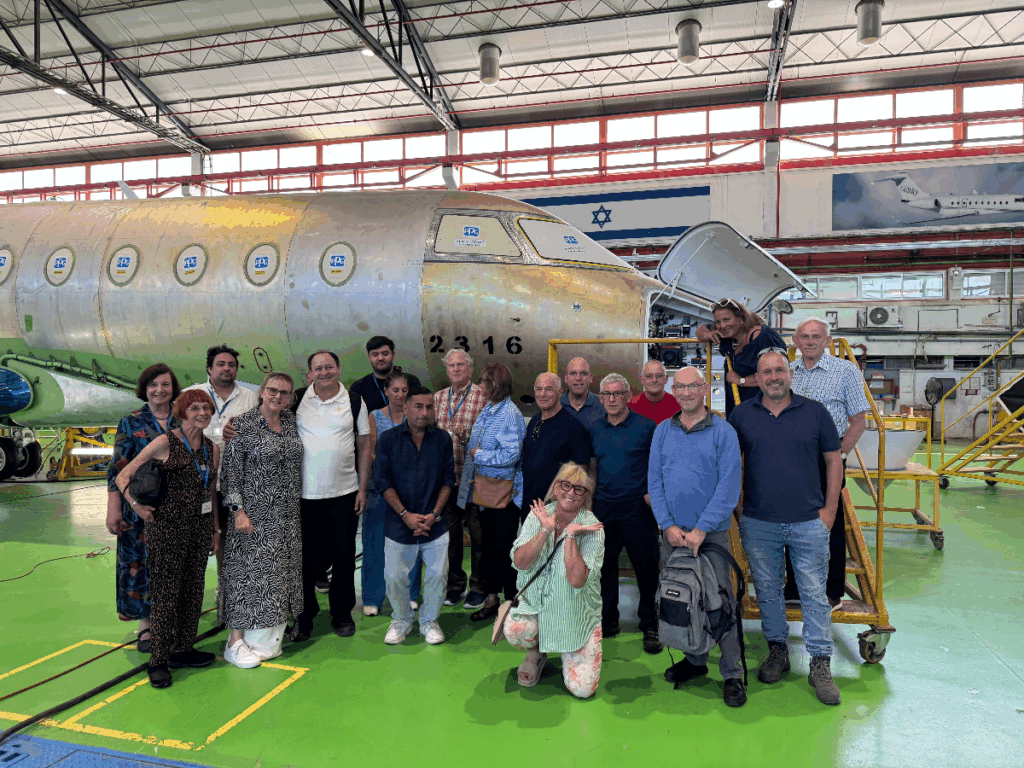
Next, the group visited Israel Aerospace Industries (IAI), where the first speaker began by sharing his personal background. He served twenty-seven years in the IDF, much of it in the field, and was wounded in the First Lebanon War. His final role was as a military attaché in Mexico, Venezuela and the Caribbean, and for the past six to seven years he has overseen Latin American operations. He highlighted how his family is deeply connected to Israel’s security, with three of his four daughters serving in elite units, two as officers. Reflecting on Israel’s ongoing challenges, he stressed that while the country has achieved significant success on the battlefield across seven fronts, it continues to lose the battle of public opinion, particularly abroad, and must do more in the media sphere.
He then turned to Israel Aerospace Industries’ cutting-edge developments, beginning with the Arrow missile defence system, first developed in the 1990s and now in its fourth generation, capable of intercepting missiles outside the atmosphere. This capability is especially critical given ongoing threats, such as Iranian missiles launched by the Houthis. He also described the Barak missile system, with ranges of 35, 70 and 150 kilometres, and the Heron UAV, leased by numerous NATO countries during the Afghanistan conflict. The Heron has been sold to over fifty countries and remains one of IAI’s most important assets. He went on to highlight the Green Pine radar, which supports Arrow interception with ranges up to 5,000 kilometres, alongside IAI’s extensive radar spectrum covering tactical to strategic needs.
The presentation also touched on Israel’s layered air defence: Arrow for exo-atmospheric interceptions, David’s Sling for medium range, and Iron Dome for short range, with each system working in coordination. He noted that IAI produces the missiles, command-and-control, and launchers for Arrow, while Rafael manufactures Iron Dome’s interceptors. Questions from participants led him to discuss Israel’s laser defence projects, competition and cooperation with other Israeli firms such as Rafael, and the importance of cyber defence for critical infrastructure. He proudly cited the Beresheet lunar mission, developed on a limited budget, which made Israel the third nation to reach the Moon, albeit with a crash landing.
He went on to describe IAI’s reorganisation from six divisions into four, including the Aviation Group, which is a global leader in converting passenger aircraft into cargo carriers, holding unique licences such as for the Boeing 777. Military contributions include wings for the F-16, F-15 and F-35, as well as special mission aircraft serving as “flying intelligence agencies.” He emphasised that unmanned systems, once dismissed as toys, now make up roughly a third of the Israeli Air Force’s operations. Robotics and unmanned maritime systems were also mentioned, with their role in reducing human risk.
Concluding, he stressed that IAI’s approach is one of providing “systems of systems” tailored to each country’s threats—whether terrorism, drug trafficking or illegal fishing—combining radars, UAVs, surveillance and cyber solutions. Questions about Israel’s defence independence led him to acknowledge the reliance on US platforms such as the F-35, while noting Israel’s strength lies in customising and upgrading them. He also addressed concerns over Iranian missile technology that splits into multiple warheads, explaining that Arrow-4 is designed to counter exactly such threats. Finally, he thanked participants for their support of Israel during difficult times for public opinion abroad and encouraged closer ties, even suggesting aliyah as a way of strengthening Israel’s future.
Daniel, the division head at IAI
The group received an in-depth briefing from Daniel, the division head at IAI, inside their main hangar—an impressive space that also functions as a working area and an exhibition. He began with a historical perspective, noting that IAI has been involved in UAV development for nearly fifty years, beginning shortly after the Yom Kippur War. Their first operational UAV, the Scout, entered service in 1980, and although technology has advanced significantly since then, the core concept has remained the same: UAVs provide real-time intelligence.
Daniel explained that UAV systems consist of four key elements: the UAV itself (“the bird”), the ground control station, the communication systems (line of sight and satellite for longer ranges), and the onboard sensors or payloads. These sensors include cameras (day/night), laser designators, signal intelligence, and radar systems—capable of detecting and tracking targets on land, sea, and air. The UAVs are built from composite materials, making them light yet strong, and they operate at high altitudes, often around 35,000 feet.
Operationally, IAI’s UAVs are highly automated. They can take off, fly, and land autonomously, with operators only responsible for directing the mission and controlling sensors. Missions can last over 24 hours, with some drones having achieved up to 52 hours in the air. The largest UAVs can weigh up to six tonnes with wingspans of 27 metres, and although they do not refuel mid-air, strategic mission planning ensures continuity through handovers.
Despite the scale and capability, these systems are restricted to government-to-government sales due to their sensitive nature. Daniel acknowledged the risk of technology being copied but noted that internal systems are distinct even when external designs appear similar. The briefing concluded with a discussion on UAV resilience, the balance of risk during missions, and the sophisticated training provided to overseas clients. The overall impression was one of cutting-edge technology, long-term operational insight, and strategic defence capability.
G280 Jet assembly line
Next, during the visit to the Israel Aerospace Industries (IAI) facility, the group received a comprehensive tour of the G280 production line, one of the world’s top aircraft in the midsize private jet category. The guide explained that the aircraft is assembled in stages, beginning with the joining of three major fuselage components—each constructed separately before being combined in the first station, which marks the aircraft’s initial structural formation.
The wings, which are “wet wings” (meaning they double as fuel tanks), are attached using four large screws, with the landing gear installed underneath. The tour highlighted the “stuffing” stage, where the interior systems—hydraulics, electrics, and avionics—are meticulously fitted. Each assembly station operates with a level of synchronisation akin to an orchestra, where timing and precision are paramount. Each unit typically spends seven days at a station before progressing, and all jets are made to order, with production currently booked at least a year in advance.
Components are sourced globally: wings from Korea, small parts from the U.S. (including from Honeywell), though much of the manufacturing is completed in Israel. The tour guide shared notable celebrity ownerships—Shakira owns a G280, while Cristiano Ronaldo previously owned a G200, the G280’s predecessor.
Priced around $24 million before custom interiors, the aircraft is completed in Israel but flown in its “green” (unfinished) state to Dallas, Texas, for final interior design and finishing. Clients often opt for high-end fashion-branded interiors such as Versace or Christian Dior, underscoring the aircraft’s status as the “Bentley” of private jets.
In later stages, the aircraft undergoes intensive operational testing, including fuel and landing gear checks, to ensure 100% performance integrity. The visit concluded with a group photo in front of the aircraft, celebrating the impressive achievements of Israeli aerospace engineering.
Currently, the IAI export approximately £80m worth of product to the UK.
Combat Soldier Lotem
This evening’s speaker, Lotem, offered a powerful and deeply personal insight into the life of an Israeli reservist and combat commander. At 46 years old, Lotem emphasised that he considers himself first and foremost a civilian, not a professional soldier—despite having spent the majority of the past two years in uniform due to the ongoing conflict. His military journey began with regular service, which extended to four years following officer training, after which he transitioned into reserve duty. Over time, he rose through the ranks to become a battalion commander, responsible for around 500 soldiers.
Lotem underscored the unique structure of the IDF, where the majority—around 70 to 75 percent—of combat personnel and commanders are reservists, not full-time soldiers. This reality places a significant burden on individuals like him, who must balance professional careers, family responsibilities, and academic pursuits with repeated and extended deployments.
The last two years, marked by what he described as Israel’s longest war, have been particularly taxing. Lotem personally completed over 500 days of military service in this period, while his infantry soldiers served an average of 350 days. Much of their activity was focused in Gaza. Despite the physical and emotional toll, Lotem spoke candidly about the resilience and determination required to juggle military duties with civilian life, highlighting the sacrifices made not just by the soldiers, but also by their families and communities.
He encouraged questions from the audience throughout his talk, preferring a more interactive and open discussion to best convey the complexity and human side of his experience.
Yisroel Ernest
To mark the end of the programme which will be the next day, the programme was lightened with a joyful musical interlude led by Yisroel.
With warmth and enthusiasm, he welcomed everyone and invited them to join in singing and dancing whilst he sand various familiar Israeli songs, creating a relaxed and celebratory atmosphere to close the day.
Day 4 Album
Last Day
Briefing from journalist Jotam Confino
Journalist Jotam Confino opened the final day of the trip with a powerful and candid briefing, drawing from his extensive experience as a Danish-Israeli journalist covering the region. Living in Israel for seven years and working with major outlets such as the Telegraph and the New York Sun, he offered a uniquely personal and professional perspective on the challenges of reporting in a deeply polarised and volatile environment.
Jotam reflected on his own transformation as a journalist. Prior to October 7th, he often concealed his Israeli background and approached reporting with a self-critical lens. However, that day marked a turning point, forcing him to reassess not only the conflict but also the state of journalism itself. He lamented the decline of journalistic integrity in Western media, attributing it to a systemic failure where narratives are too often driven by ideological alignment rather than rigorous fact-checking.
He outlined the immense difficulties of covering the war in Gaza, noting that journalists have no independent access and are largely reliant on five flawed sources: Hamas, NGOs, local journalists, civilians, and the IDF. He criticised NGOs for their political bias and reliance on information from Hamas-affiliated entities, asserting that this dynamic results in a cycle of misinformation that becomes legitimised once NGOs echo Hamas narratives—creating a path for mainstream media to report these as facts.
Jotam was particularly scathing about the media’s unwillingness to challenge information emerging from Gaza and accused Western outlets of failing to apply the same scepticism to Palestinian sources that they do to Israeli ones. He underscored the danger of such reporting, not only in misrepresenting the conflict but in fuelling antisemitic sentiment globally.
He also shared insights from his recent visit to South Lebanon with the IDF, revealing that despite a ceasefire, daily skirmishes continue and Hezbollah remains a persistent threat. In Gaza, he foresees further escalation, including a likely offensive in Gaza City, which he predicted would be brutal due to Hamas’s entrenched defences.
On the West Bank, Jotam described a more controlled but still volatile situation, with Israel taking aggressive steps to dismantle terror networks—efforts that have so far averted larger-scale conflict, though the threat remains constant.
Audience questions allowed Jotam to elaborate on issues ranging from NGO complicity to the Red Cross’s inaction, the challenges of public advocacy in the UK, and the strategic failure of Israel’s PR. He encouraged diaspora communities not to retreat in fear but to mobilise publicly and consistently, noting that the scale and frequency of Palestinian-led demonstrations have a tangible impact on government policy.
He concluded with a personal reflection on the toll this work has taken, admitting that the psychological burden is immense. Nonetheless, he feels a moral obligation to counter dangerous narratives, as misinformation has real-world consequences, including violent antisemitism.
Jotam’s session was a sobering and essential reminder of the power and responsibility of media—and the critical need for truth, courage, and vigilance in defending it.
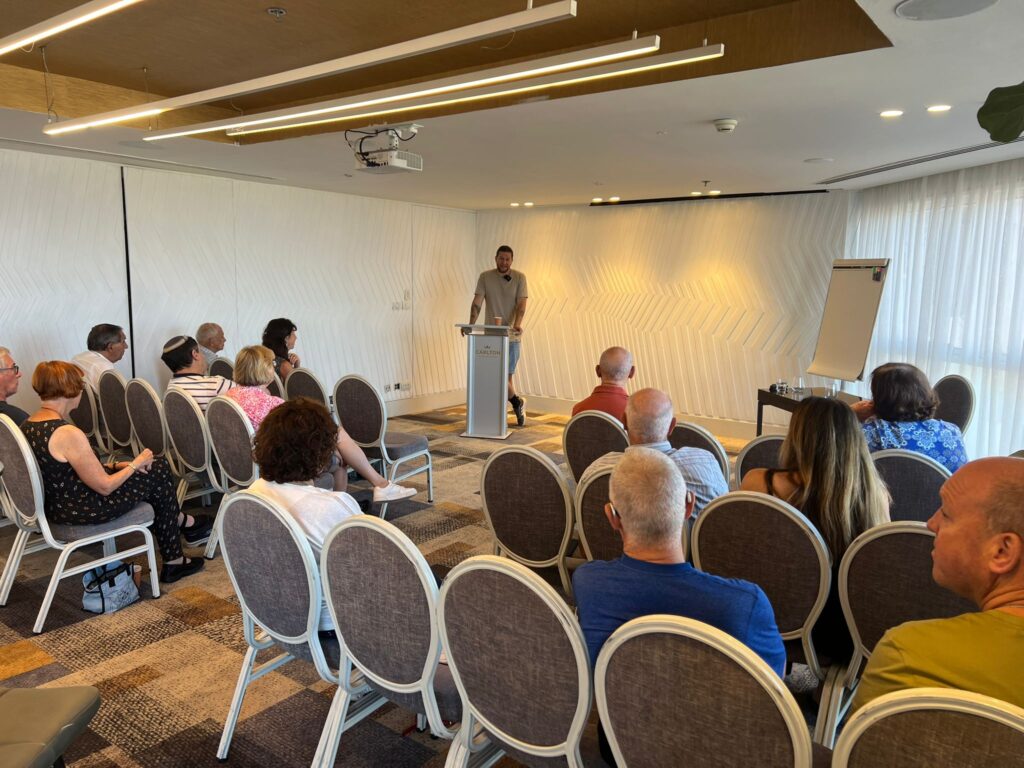
Israeli wine tasting on the Carlton hotel roof top
At today’s wine tasting session, we were taken on a rich and personal journey through Israeli wine culture, guided by Asaph, a viticulture and enology student, and Rivka Baum, co-founder of Family Baum Winery. Together, they introduced a curated selection of young, artisanal Israeli wines, each representing distinct terroirs—from the desert vineyards of Mitzpe Ramon to the lush, volcanic soils of the Golan Heights.
Rivka’s contributions were particularly compelling. She shared her evolution from an internal medicine nurse to a winemaker, a transformation that paralleled her personal and national challenges. With heartfelt openness, she recounted how, following the 7th October attacks, her husband Sam—who transitioned from IDF service to viticulture—was immediately called up, leaving her to single-handedly oversee the 2023 vintage. With no prior experience, but driven by resilience and love, Rivka pressed forward, completing the vintage as a tangible act of hope and connection with her husband, then in active combat.
Their wine is not just a product; it is an embodiment of survival, heritage, and devotion. As Rivka explained, winemaking at Family Baum Winery is a deeply intentional process, rooted in minimal intervention and a profound respect for the land. The vines are tended with care, and every bottle reflects not only the terroir of the Golan but also the unique spirit of the family behind it.
The branding of their wine is deeply symbolic. The label from Vintage 2023, named We Will Dance Again, features a tear in the shape of Israel, honouring the national trauma of that year and especially the Nova survivors. The winery’s emblem—a tree formed from the fingerprints of Rivka, Sam, and their young son Lavie—beautifully represents their personal bond and generational connection to the land. As Rivka movingly expressed, “We want to be the bottle that accompanies people through life’s milestones,” reflecting their vision of Family Baum Winery as more than a business—it is a legacy.
Rivka also introduced the group to kosher winemaking intricacies, the fusion of science and intuition in production, and the unique role of women in the industry. The evening was as much about storytelling and community as it was about wine, capturing the spirit of the land and people of Israel in every glass.
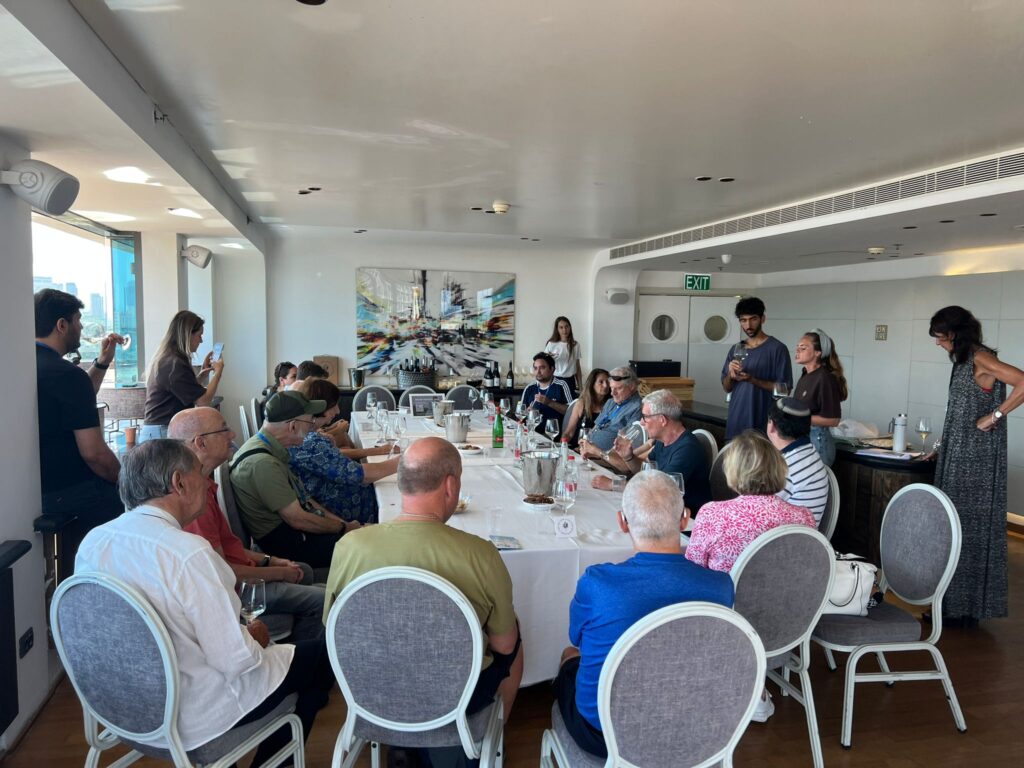
The bottle you hold
For the Jewish people, wine has always been more than just a drink. It is tradition, survival, and memory in liquid form. It is raised in times of joy and held close in times of sorrow. This vintage, like the people who created it, was shaped by the weight of history yet determined to endure.
The bottle in your hands has journeyed through war, loss, and longing. It very nearly didn’t come to be. And yet, it prevailed through love, through hope, and through the unyielding strength that has always fortified the Jewish soul.
Lovers of the land and its people
Every bottle of Baum is lovingly handcrafted by husband-and-wife, Rivka and Sam, with encouragement from their most devoted critic, their three-year-old son, Lavie.
The Family Baum Winery tree is imprinted with their fingerprints, their very DNA entwined with the land they cherish. More than a business, it is a legacy, built on love, resilience and an unwavering connection to the land of Israel and its people.
Like the wine itself, they know that time deepens and refines. And just as the vineyard matures with each passing season, so too does their journey.
Family Baum Winery
There is undoubtedly a familiarity of the Golan Heights in its slow-paced pastoral lifestyle that is easily found on Bollin walks in Hale or walking past the horses on Rossmill Lane. It has been a while since Rivka was last “home” for a visit and since then she has gone from being an internal medicine nurse to co-founding a winery with Sam, whom she married in 2018.
After five and a half years of IDF service, Sam vowed that if he wasn’t protecting the land, he’d work it. He began his career in wine at Domaine du Castel, working his way up from folding boxes to becoming head grower. Craving a return to the cellar, he and Rivka built a micro-winery in their garden. Thus, Family Baum Winery was born.
Their third harvest, Vintage 2023, began just two days before war erupted. With Sam called up to serve and communications severed, Rivka continued winemaking alone, using it as a lifeline of connection and hope. Their wine style evolved from a Bordeaux blend to a terroir-driven Syrah and Carignan—reflecting the Levantine landscape and crafted with minimal interference.
Their long-term vision is simple yet profound: to be the bottle that accompanies people through life’s milestones. With 2,000 bottles of Vintage 2024, half sold out in just 12 hours, their direct-to-consumer model thrives on real relationships and community.
To join their Vintners Circle or reserve a bottle, visit www.familybaumwinery.com, and follow their story on Instagram @familybaumwinery.
Pre-orders for Vintage 2024 are now open – reserve your bottle at:
https://familybaumwinery.com/reserve-your-bottle-of-baum-vintage-2024/
If you’d like to get in touch, contact them directly via:
Email: Familybaumwinery@gmail.com
WhatsApp: +972 54 229 4529
As Rivka puts it, she may have swapped her lychee cocktail for a glass of silky Syrah, but the heart of her story remains the same—deeply rooted in connection, courage, and love for the land and its people.
Closing debrief sessions by Alan and Ida
We concluded the trip with a powerful and emotional sharing circle, where each participant reflected on their personal highlights and the moments that moved them most. Across the board, there was an overwhelming sense of gratitude, inspiration, and awe at the breadth and depth of the programme.
Several attendees spoke about the profound impact of meeting young soldiers and hearing their personal testimonies—stories of courage, resilience, and service that brought many to tears. The session with the Nobel Prize winner and the address by Major General (ret.) Jacob Nagel were frequently cited as standout moments, offering unmatched insight into Israel’s defence strategy and geopolitical realities.
The visit to the Druze village also left a lasting impression. Participants were deeply touched by the hospitality and the powerful, emotional testimony of a Druze woman, whose story of her community’s suffering resonated strongly. Many expressed a newfound awareness and commitment to amplifying the Druze voice and exploring ways to support their cause.
Technical visits, such as those to the Technion and the Rambam underground hospital, captivated the group with their innovation and ingenuity. Several guests, including seasoned visitors to Israel, noted they had never experienced anything like this level of access and expertise. The opportunity to see drones and defence technology up close was described as “jaw-dropping,” and the underground hospital was likened to a science fiction scenario brought to life.
The variety and calibre of the speakers throughout the trip was consistently praised. From journalists to high-ranking officials, the speakers offered diverse and enriching perspectives on Israel’s challenges and triumphs. The thoughtfulness behind the programming, balancing emotional weight with light-hearted moments—such as the party and chocolate pizza—was also appreciated.
We had one First-time traveller whos expressed how the experience had transformed their understanding of Israel, building a much stronger personal connection and providing tools to better articulate Israel’s position back home. There was a heartfelt call for making these trips more accessible to younger generations, who could be deeply influenced by such immersive experiences.
The praise extended to the organisers, with repeated thanks to Ida and Alan for their tireless work, flexibility under pressure, and attention to detail. Attendees acknowledged the complexity of arranging such a multifaceted itinerary, especially amidst the unpredictable realities of life in Israel.
In closing, the group recognised that beyond the itinerary itself, the real magic lay in the shared experience—strangers becoming friends, united by their curiosity, solidarity, and deepened commitment to Israel. Many vowed not only to return but also to become ambassadors for future trips, ensuring others can discover the same powerful, eye-opening journey.
Interested in our next Israel trip March 2026?
If you are interested in finding out about the next trip please email: alanaziz@technionuk.org or register your interest here:

Last Day Album
Thanks for organising an amazing trip which will live long in the memory! It was a fantastic experience, well organised with a great variety of meetings, trips and experiences. Well done to you and Alan and thanks for hosting some of my friends and family! hope you had a restful few days after! Take care,
Ben
I appreciate the hard work you and Alan put in to organising the recent trip. The daily activities were well planned, very interesting and at times an eye opener on the ongoing innovations being undertaken especially at the Technion.
Michael
I would strongly recommend future trips to everyone. They will come back in awe at times at what a fantastic country Israel is and how lucky we are to be part of it.
“It was so wonderful to experience the crème de la crème of Israel. From visiting the Technion and hearing from inspirational professors like Prof. Marcelle Machluf, whose groundbreaking Nano ghosts are paving the way for Alzheimer’s cures, to engaging with incredible speakers like Mayan Jaffe and the ever-compelling Miri Eisen; the experience was truly remarkable and was a real insight into the start-up nation mentality.
Tali Kramer
Visiting both Hostage Square and Mount Herzl was deeply emotional and a stark reminder of the ongoing struggle, as we keep the hostages in our thoughts and prayers, hoping for their safe return. Also, being the first group post-October 7th to visit Abu Gosh was a profound experience, adding yet another layer of meaning to an already unforgettable trip
Visiting Channel 12 News, witnessing the innovations at IAI, and being immersed in an academic environment was eye-opening. It was equally uplifting to visit Uri Geller’s museum, meet the man himself, and explore the iconic new Jerusalem National Library. Also, learning from The Times of Israel founder, a former Brigadier General in the I.S.A, and IDF soldiers provided invaluable insights into the country’s leadership, security, and resilience.
This inspiring trip is a must for anyone, young or old, seeking to deepen their understanding of Israel, its extraordinary people, and its rich culture. I can’t recommend it enough!”
A rather belated thank you to both for an incredible trip and learning experience.
Karen and Mark
You packed so much in and all so informative and rewarding.
I am still thinking about so much of it
A few short words for your publicity-
A trip like this leaves its legacy and so much food for thought.
It marks both the ever present threat and current sense of despair against a backdrop of hope and optimism manifested
In the incredible development and achievements of the Technion.
Such a mix of emotions throughout each day – understanding the dilemmas that face the people of Israel and and then surrounded by
The country’s beauty and advancements the modern world. The trip curates a careful balance between the two with speakers, visits to key sites and
Dialogue to digest and understand.
Come away as a Jew feeling connected, worried but hopeful for a better future
Thank you both again
Let me know the dates of your next trip in case anyone should ask and we can pass on.

